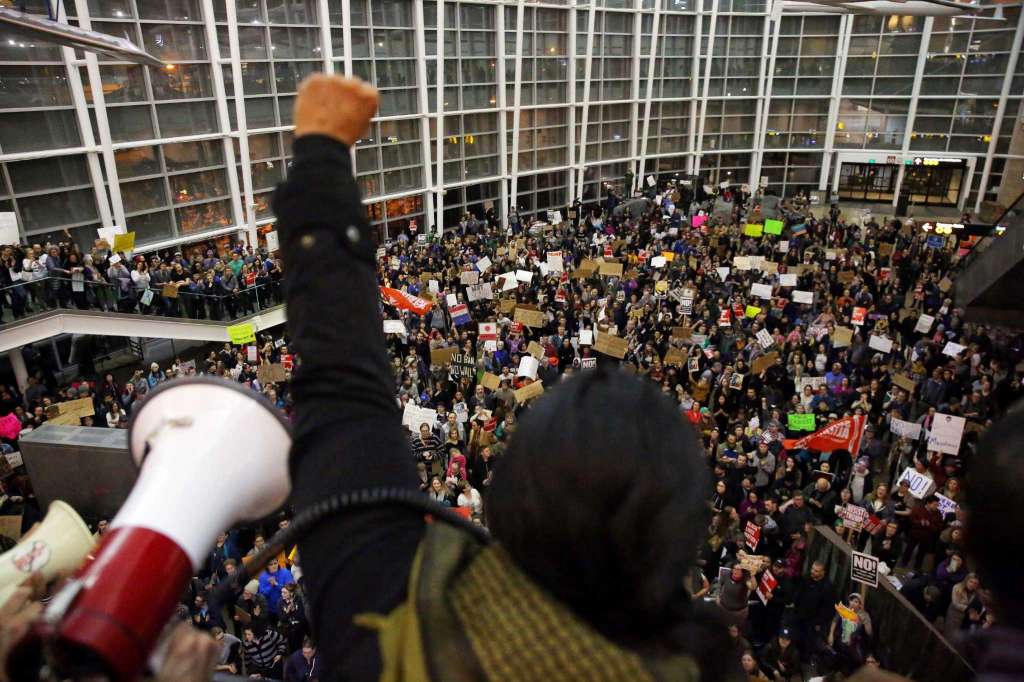
With his first string of executive orders, Trump is leading an assault on all of us, on all fronts at once. He’s gambling that he can break our spirit and set a precedent for obedience over the years to come. In courageously filling the streets, blockading airports, and interrupting business as usual, we are setting a precedent for resistance that could ultimately enable us to block his agenda.
We will be continuously posting narratives and updates from this weekend’s actions here. Please send us reports if you can: tips@crimethinc.com
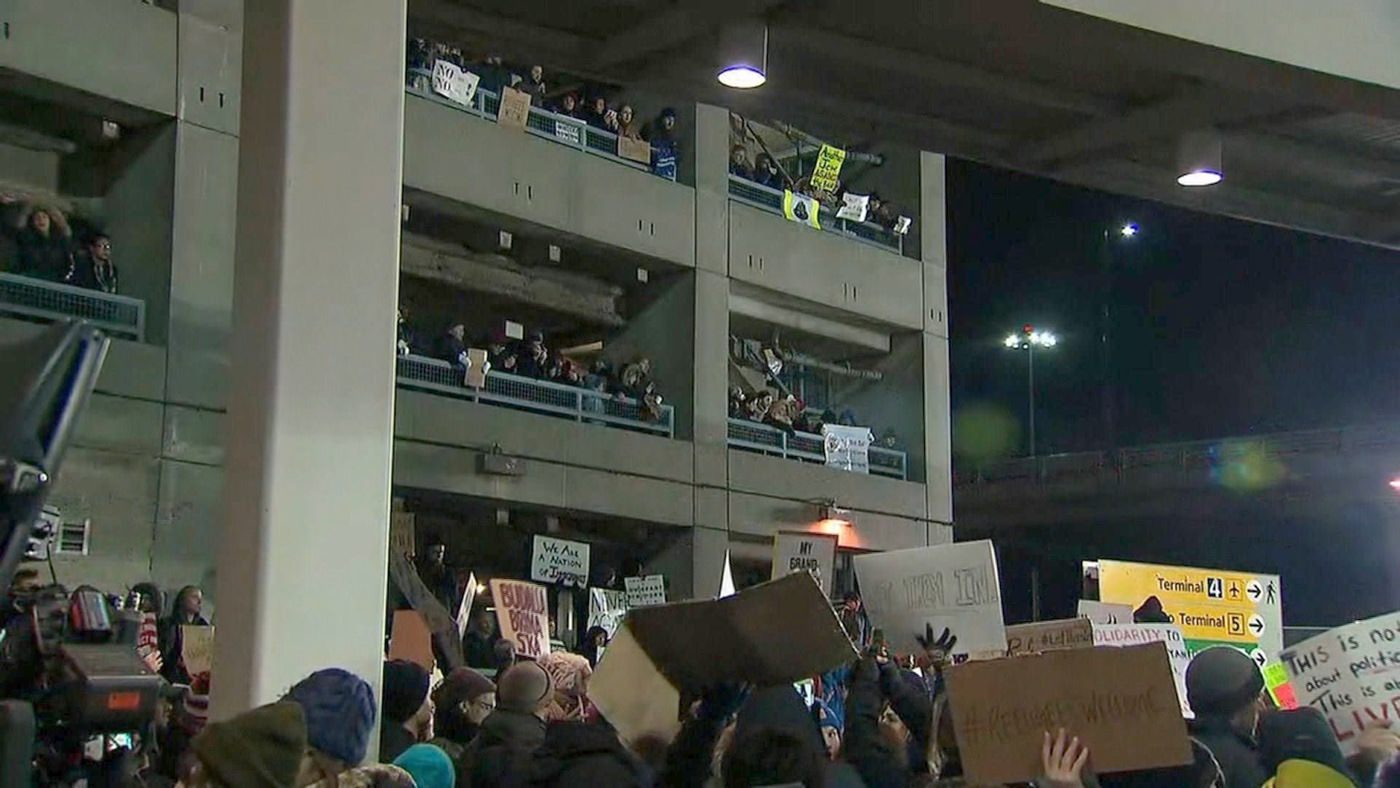
This weekend has set a precedent for confrontational protests targeting essential infrastructure as people spontaneously gathered at airports around the country in response to Trump’s ban on Muslims.
Despite posting reports from ten cities, we have only been able to report on a small fraction of the demonstrations and actions taking place across the US. We received reports that I-95 was shut down in Philadelphia, while thousands marched through downtown Seattle. Hundreds gathered in St. Louis, Detroit, and countless other cities.
All this establishes a good example for the future. It is essential that we fight back against Trump immediately, before any of his programs can become normalized.
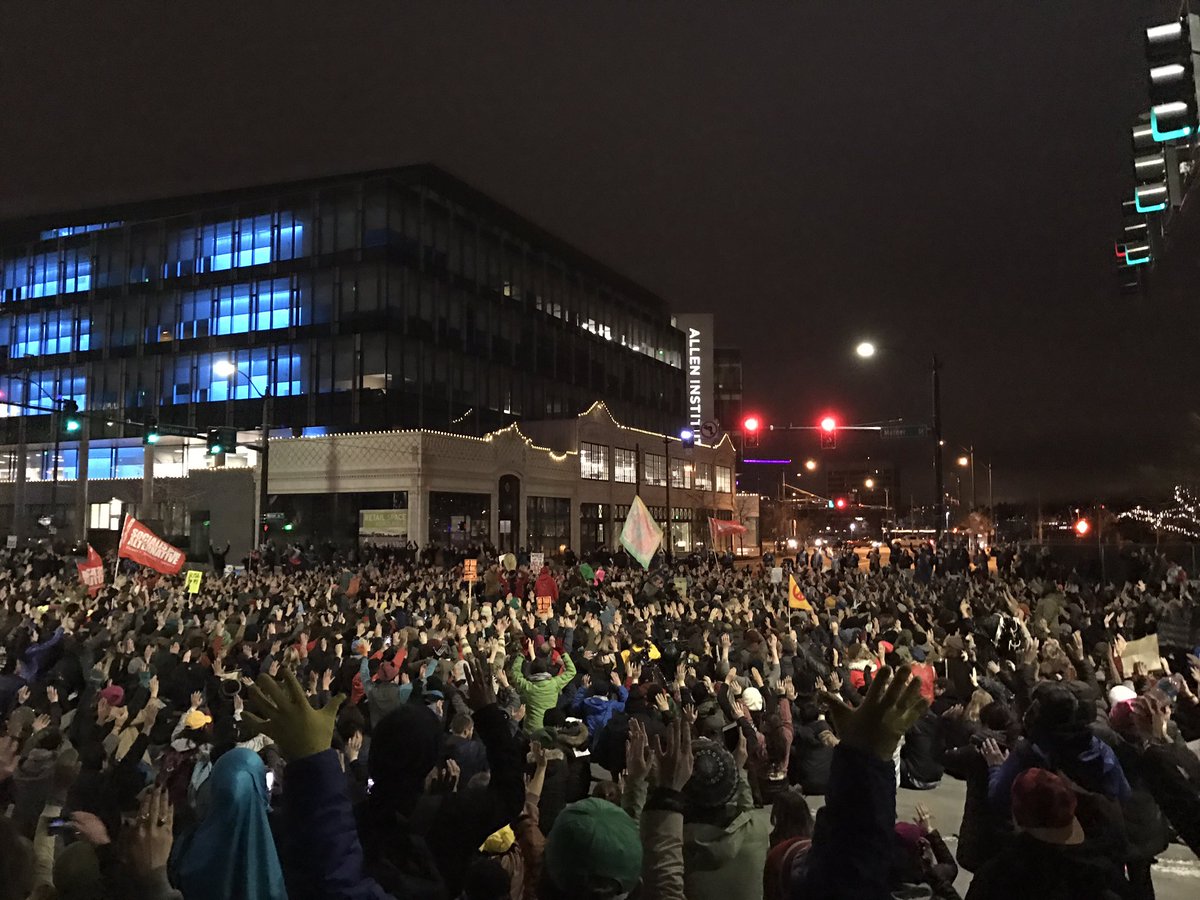
Protest march in downtown Seattle.
But we must not rest on the laurels of a few airport shutdowns. Even winning a small rollback on some aspect of the ban should not satisfy us. A real victory would mean pushing back immigration controls that date from Obama’s administration and earlier. Let us not forget that Obama deported more people than all the US Presidents of the 20th century added together.
These immigration controls are only one aspect of the Trump agenda, only one of the many executive orders he has already signed. As our comrades at itsgoingdown.org report,
“These orders call for the construction of a massive border wall, the hiring of 10,000 ICE officials to speed up expected massive deportations, and the beefing up of border guards by 5,000 officers along the Mexican border. While liberals and celebrities have laughed at Trump’s fascistic ambitions from the start of his Presidential run, there is no sign that Trump will back away from his plans, as he has set in motion all of his previous goals so far. Moreover, in true proto-fascist fashion, Trump is also hoping to play up the reality that with racist repression (as with massive resource extraction projects), also comes jobs; ‘good jobs’ that are part of police associations which are also loyal to Trump himself. In this way, Trump can to a small degree, begin to make ‘a new deal’ for at least part of the working-class that is willing to take part in his attempt to redefine who is included, and who excluded.”
We should scrutinize the dynamics within the state itself right now as Trump carries out an internal power grab. The state has not been this internally divided in the United States in living memory. This creates new opportunities for us, but it also makes the terrain less predictable. We may suddenly face an unexpectedly severe crackdown, or find ourselves with unlikely allies, or discover that some of the people beside us in the streets aren’t allies at all.
In “Trial Balloon for a Coup?” Yonatan Zunger draws four conclusions from the machinations of the Trump regime throughout the past week:
- Trump was, indeed, perfectly honest during the campaign; he intends to do everything he said, and more. This should not be reassuring to you.
- The regime’s main organizational goal right now is to transfer all effective power to a tight inner circle, eliminating any possible checks from either the Federal bureaucracy, Congress, or the Courts. Departments are being reorganized or purged to effect this.
- The inner circle is actively probing the means by which they can seize unchallenged power; yesterday’s moves should be read as the first part of that.
- The aims of crushing various groups — Muslims, Latinos, the black and trans communities, academics, the press — are very much primary aims of the regime, and are likely to be acted on with much greater speed than was earlier suspected. The secondary aim of personal enrichment is also very much in play, and clever people will find ways to play these two goals off each other.
We should not be so busy reacting to the most obvious of Trump’s assaults that we fail to craft a long-term strategy that can ultimately outflank and defeat him. The ways we fight now should position us for a long struggle, equipping us do more and push further than we have before in our efforts to abolish the state.
Good luck out there, comrades.
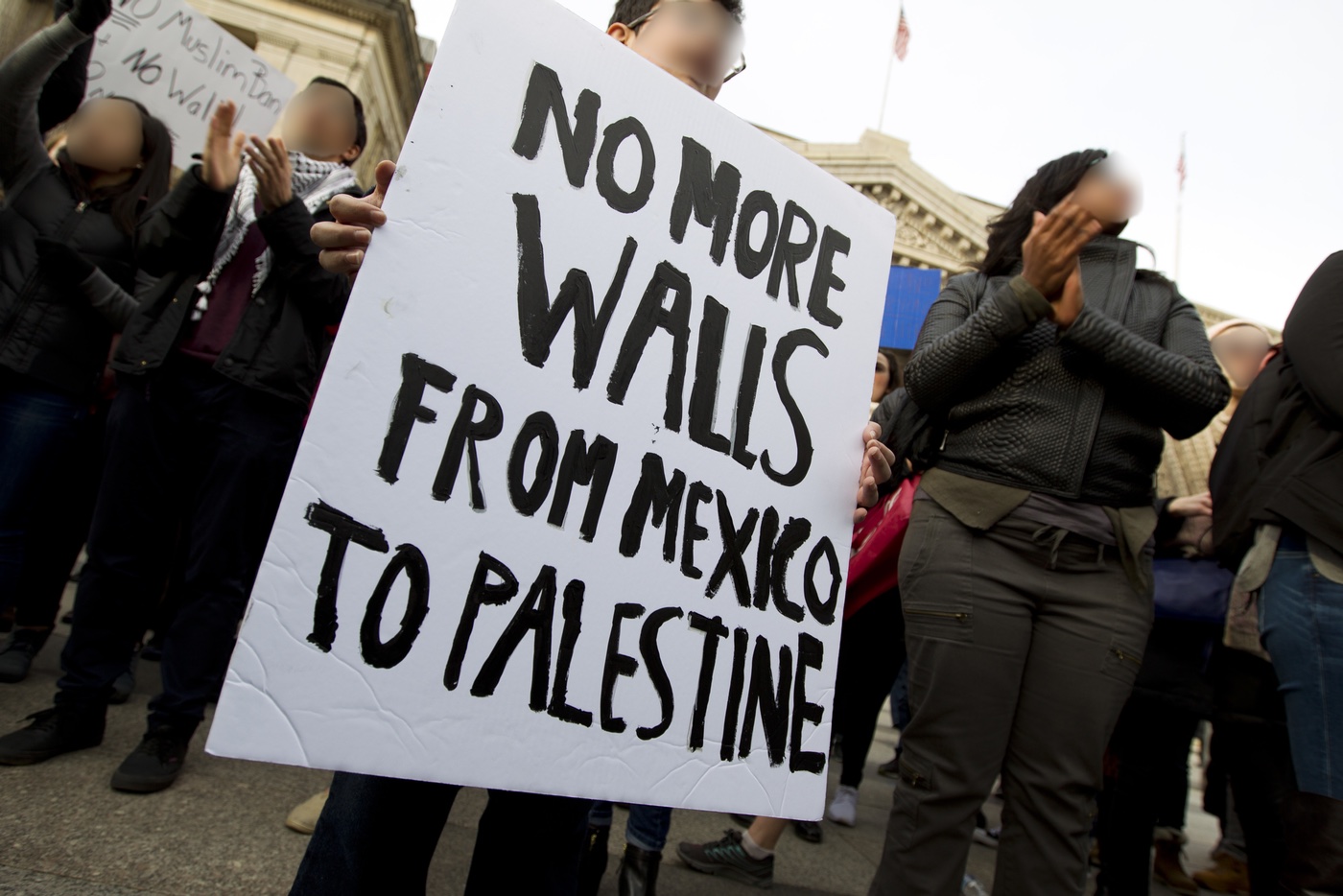
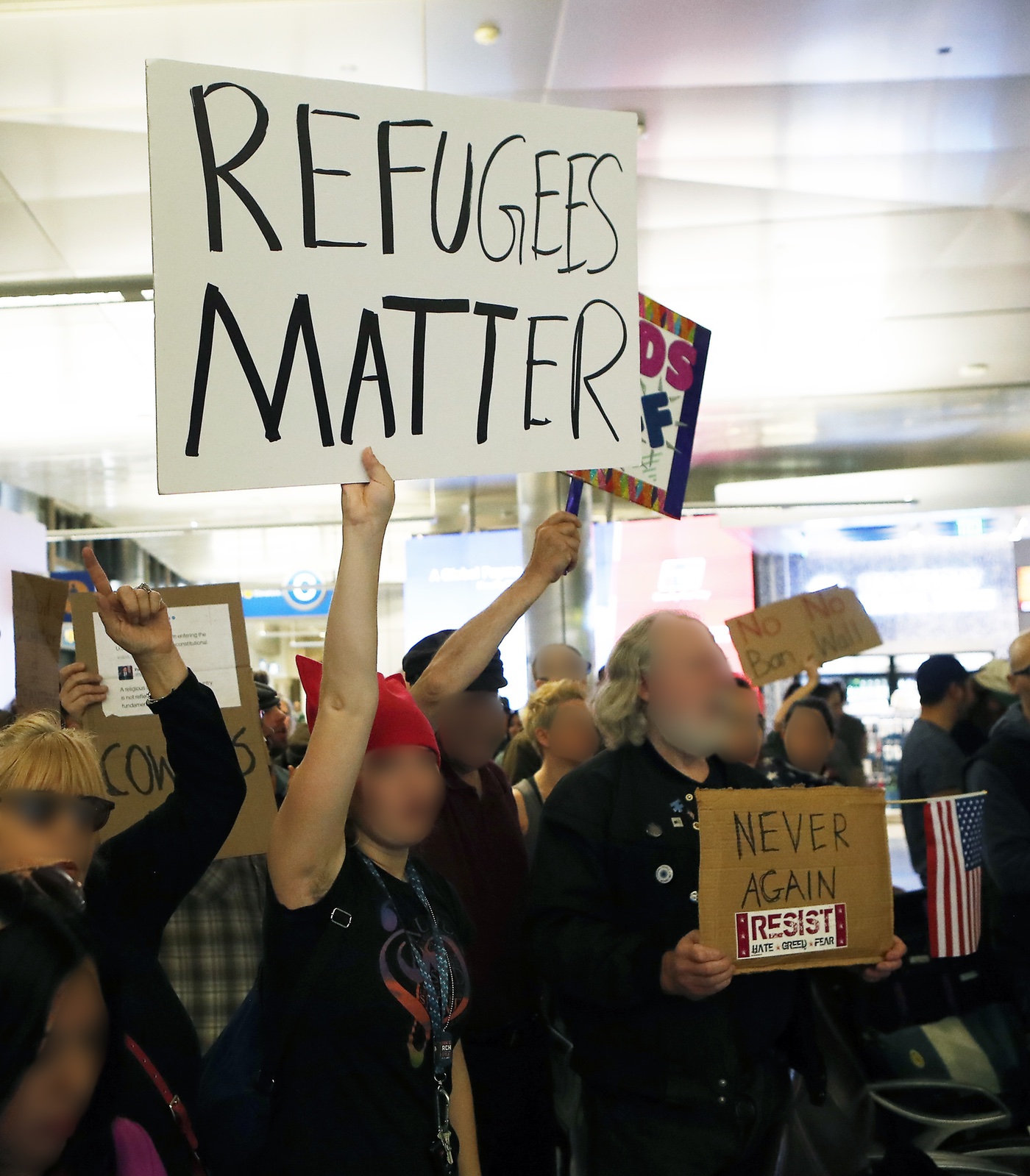
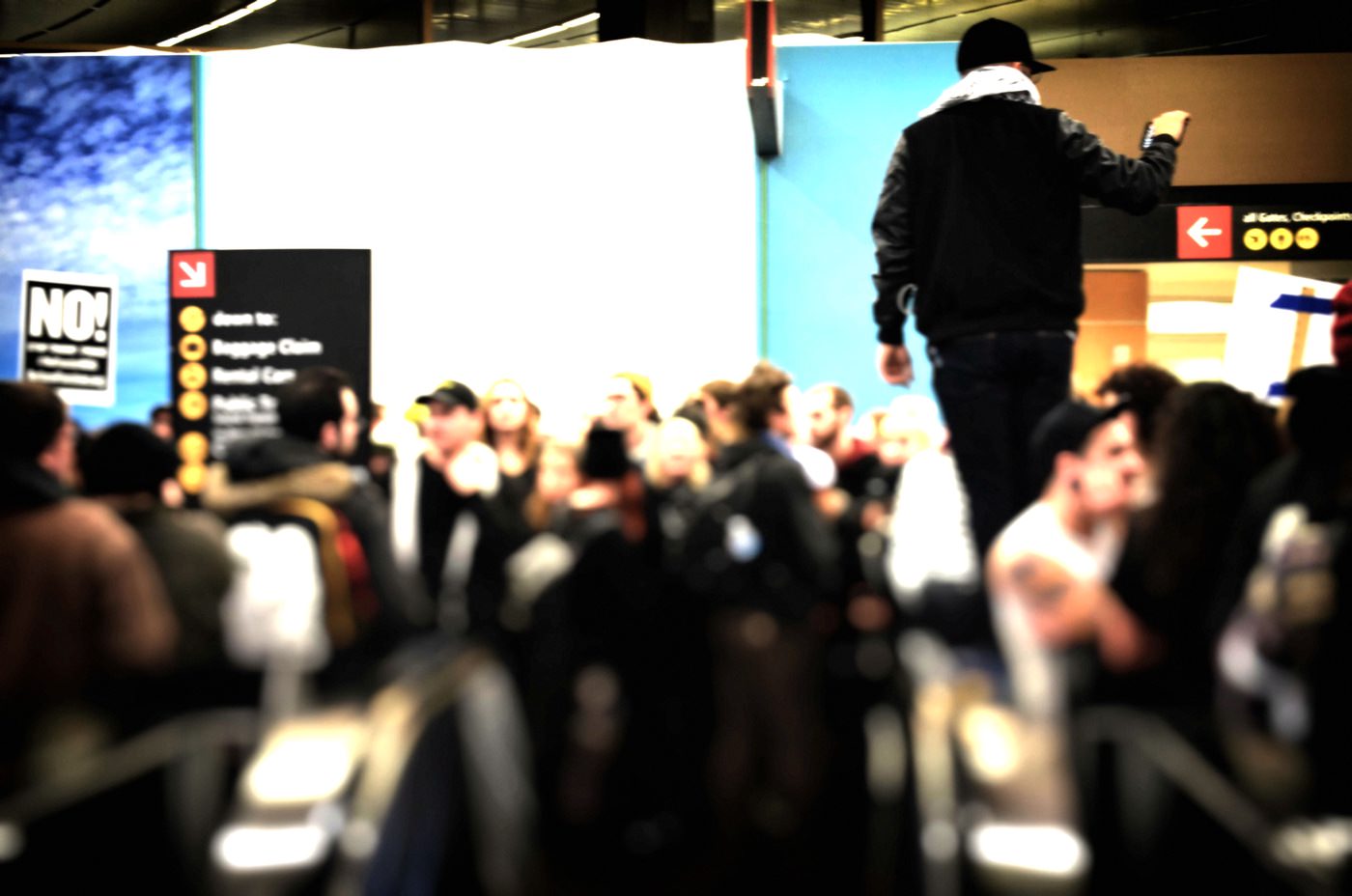
You Don’t Get to Protest When It’s Convenient
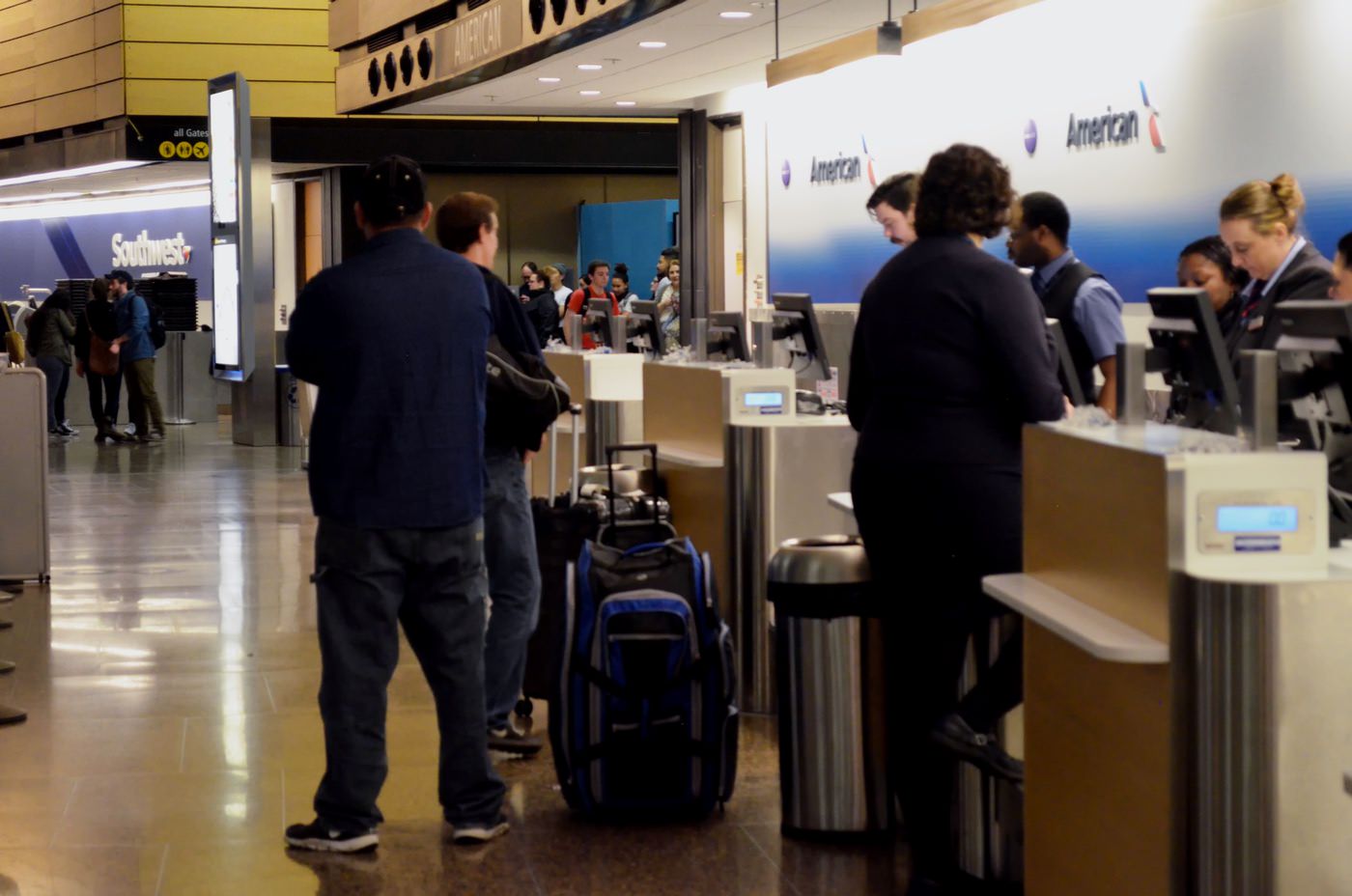
Business as usual
When my partner and I first got to SeaTac, it took some time to get oriented and figure out what actions were taking place. We eventually found a gate that wasn’t fully shut down yet and moved to help with that. As we arrived at the gate, a very nice looking woman with a stroller showed up, wanting to make a flight. A few people started shouting, “Let her through!” and through she went. I get it, she looked tired, had a child, and was very nice with saying “please” and “thank you.” However, we were there to SHUT IT DOWN, not SHUT IT DOWN OCCASIONALLY.
Most of the others there were on the same page. A group of people moved and cut off the line of passengers who tried following the woman in, fully blocking the entrance.
Soon, a woman came over and informed us that people were being let in through some side entrances. She was looking for people willing to be arrested to block those. My partner and I followed her.

The gate we ended up at was blocked three rows deep with protesters. There wasn’t much going on. Some ACLU observers were informing everyone about the legality of blocking this entrance. Nobody seemed too worried.
A white woman wearing a pussy-hat walked her stroller bag right up to the line of bodies. She seemed to think we would part for her, but instead we explained, in chorus, “The airport is closed!”
She was angry: “This is my town! My city!”
Someone responded, “You don’t get to protest only when it is convenient for you!”
She left and people cheered.
Things seemed very low-key for an “arrestable” action. It got a little tense for a second when a Kent cop walked into the crowd announcing that he needed access to the entrance. He was on the opposite side of the line from me, trying to intimidate a couple young women.
He couldn’t. Their voices never quavering, they compelled him leave.
After several minutes, people from the next gate started coming over to tell us that they were arresting people there.
The people at our gate started getting skittish and leaving.
I understood, even if I found it disheartening. Most of the people at our gate were young (maybe high-school age), not white, and not men. Unlike the pussy-hatted white woman, they knew there is no such thing as a good cop.
Arrested (or, Forcibly Removed Without Being Charged)
There still wasn’t much going on at our gate, and enough people had peeled off that we didn’t even stretch across the entire entrance. Someone came by with news: “People are getting arrested at gate A and we need people to hold the line.”
My partner and I moved over there and I joined their line. Soon afterwards, a group of cops pulled me backwards from behind and threw me to the ground. I locked my own arms, and was surprised when the cops couldn’t separate them or turn me over.
That satisfaction didn’t last long. I heard a cop on the group on top of me say, “Here, use the stick, use the stick.” I don’t know if he was bluffing or not, but I was too scared to find out. I flattened out, a knee was dug into my shoulder, and my hands were zip-tied.
“Nice” Cops
Sitting against the wall, removed from the action, things got weird. Some of the other arrested protesters started conversing with the cops. Exchanging niceties. Saying “please” and “thank you,” throwing jokes back and forth. The cops kept saying, “We’re just trying to keep everyone safe.” Empty words when they are the only ones threatening violence.
One protester got the cop into a conversation.
“What would you do if Trump actually outlawed protest? Made it completely illegal?” asked the protester.
“He can’t do that,” answered the cop.
“They said he couldn’t do a lot of things, yet here we are! But answer me — if the law was that protest was illegal, what would you do?”
“If it was the law, then I would have to enforce it. That is what America is built on, laws.”
“Can’t wait to see y’all at the next Nuremberg trials,” I snapped.
The Kids Are Alright
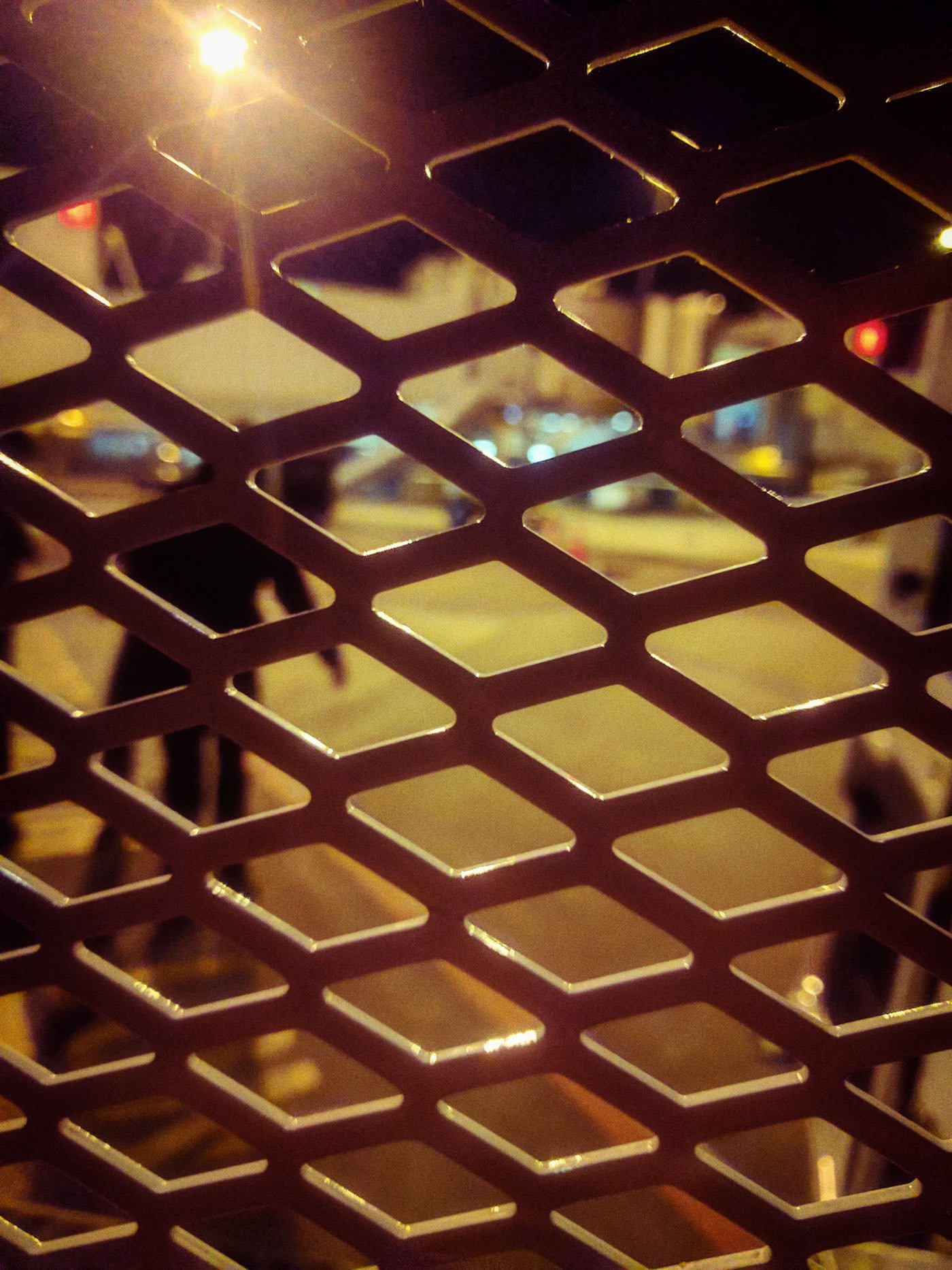
I was a bit demoralized by the time they finally stood us up and marched us to a van. The friendly back-and-forth between some of the protesters and the cops had continued and I was annoyed at how often the name of a local socialist councilwoman came out of the mouths of the protesters.
Once in the van, however, the conversation cheered me up.
Sawant seems to have undermined her own reputation. I guess she had called for people to assemble at a park in the city instead of at SeaTac. That brought her into question in the minds of these other protesters.
I also (finally) realized these were all young people, and they were fearless, smart, and mobile. Some had come down from Bellingham. They planned out how to handle things if we were charged, started exchanging numbers for future actions, and talked about their homework.
It was clear that they were not scared and not going to stop.
In retrospect, the weird conversational vibe between them and the cops wasn’t so weird. For most of them, this was their first experience with confrontational action, their first time being thrown to the ground by a cop. They were just asking “why”:
“Why are you arresting us?”
“Why are you a cop?”
“Why do you need riot gear?”
“Who do you serve?”
“Who do you protect?”
They may have still had some illusions going into this protest — illusions about police, about “reform,” about hierarchy and power. After this protest and the future actions they are determined to participate in, I have no doubt they will come to understand the police better.
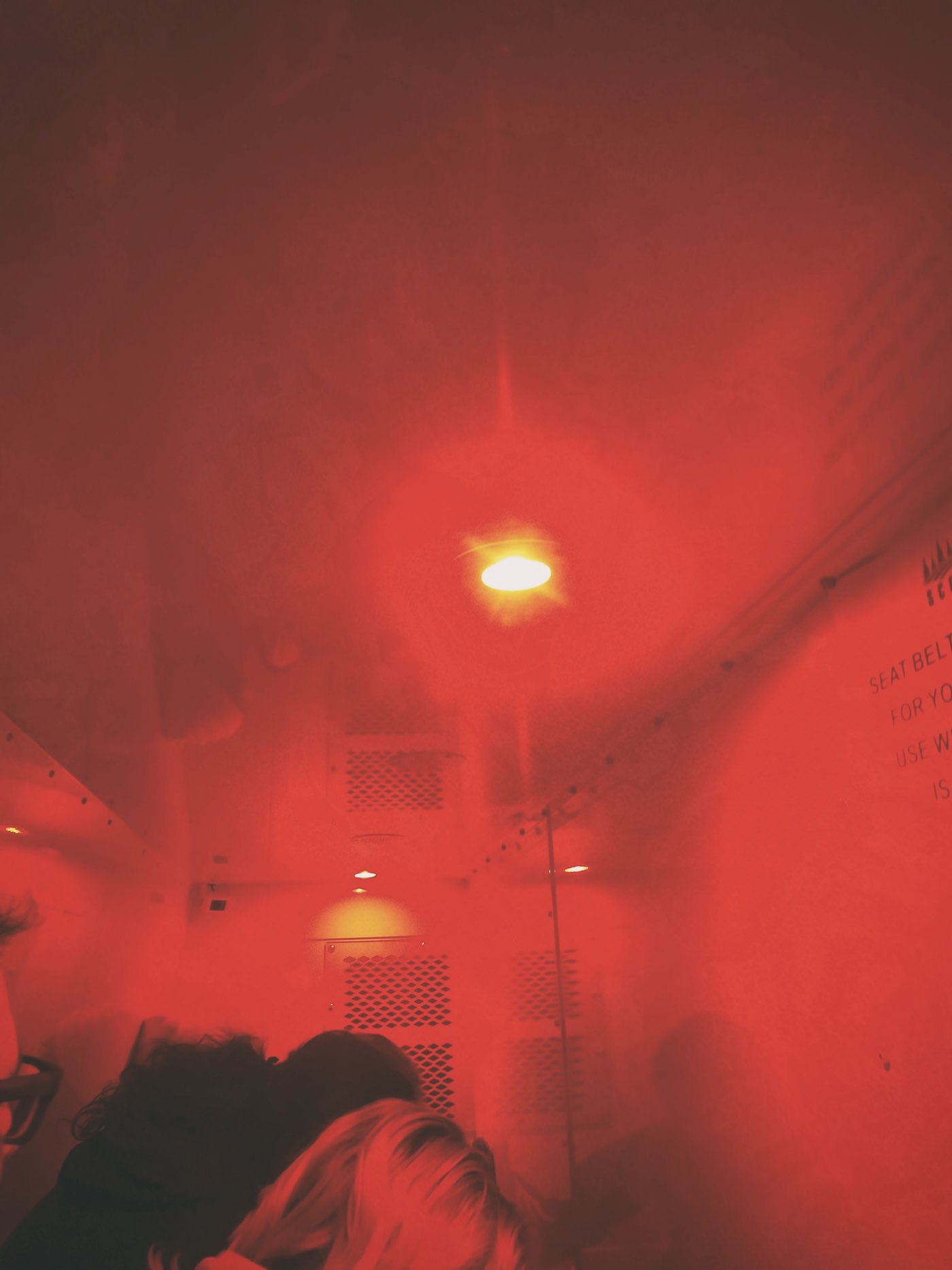
The sign reads “Seat belts provided for your safety”
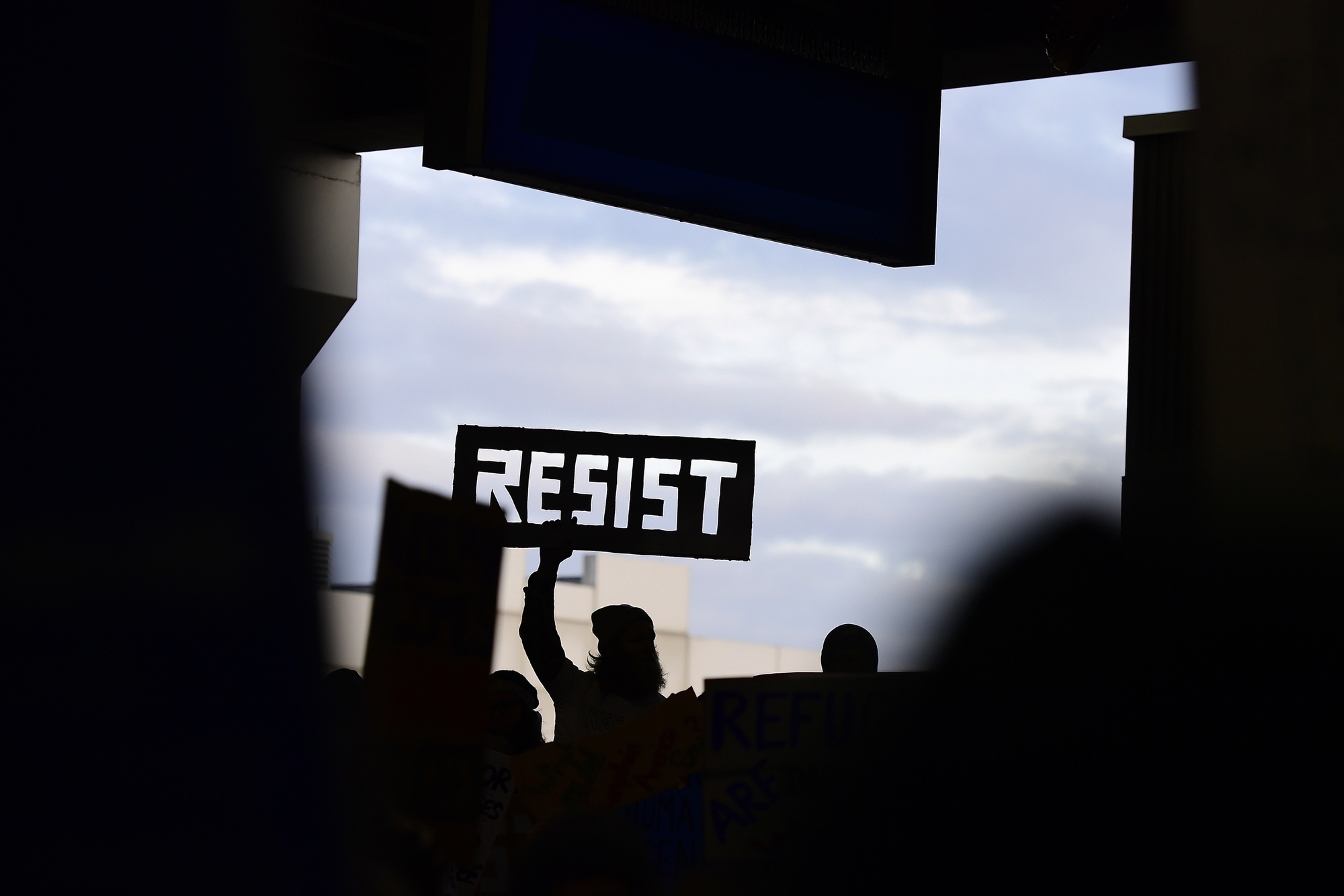
Today, people all over the world are menaced by dangerous extremists, brainwashed killers armed with heavy weaponry determined to kill or subjugate all humanity. This is not just the Islamic State—it is all states. The problem isn’t Islam, but the function of government itself. Tyranny is intensifying on all shores, as is resistance.
Trump’s ban on Muslims is not intended to keep Americans safe. It is intended to keep America safe—the coercive state structure founded on racist colonialism that protects billionaires like Trump as they go about enriching themselves at everyone else’s expense. The idea is to create such bitter national, religious, and ethnic divisions that, rather than identifying the billionaires as the source of their problems, people end up fighting each other.
Trump’s ban will tear up families, wrest people from their homes, and trap them in nightmare conditions created by US foreign policy in which they can be killed, taxed, or forcibly conscripted by the Islamic State and similar organizations. The ban is calculated to foster distrust and drive Muslims to desperate acts of revenge. Trump and his cronies must be banking on a new wave of terror attacks against US citizens to bolster their popularity and give them a pretext for further repression. We should be preparing for this right now, so it will not catch us by surprise when it happens.
In the meantime, we can respond to this situation by revolting side by side against the forces of government through which Trump intends to enforce this ban. The trust we build between communities in this process will be useful not only for diminishing the likelihood of racial and religious violence, but also for the long-term objective of rendering government impossible, creating the conditions of freedom in which all people can establish a peaceful coexistence on terms of mutual aid, solidarity, and autonomy.
In Portland, Oregon, Trump supporters, members of the Bible Believer’s Baptist Church, were being run out of the airport by the opposition when one of the members was knocked out by a single punch. Some have referred to this church as Hipster Westboro Baptist. Now we can add West Coast Richard Spencer to their nicknames.
Our airport police and entire staff would like to thank all protestors for exercising your rights in a peaceful manner. pic.twitter.com/ltyg1VaQOV
— DFW Airport (@DFWAirport) January 29, 2017
The Dallas-Fort Worth international airport was a major site in the wave of protests against the #MuslimBan. Yet the action itself raised an important question that will be debated in the days to come: what is the role of radicals in the emerging liberal-popular front against Trump?
The initial action was spontaneous and self-organized. Information was scarce and often contradictory. But after rumors spread through social media about 10, 40, more than 50 people being held in detention, people began flocking to the international terminal of the DFW airport.
The turnout for actions in the Dallas-Fort Worth area is always hard to predict. While it is one of the largest cities in the country, it lacks the mass of do-gooder activist NGOs so common on the coasts. We were excited to see so many people flock to the airport with a clear sense of purpose, in contrast to the last two months of zombie-like marches through the empty streets of downtown Dallas.
The crowds quickly grew from a small core to well over a thousand; those who had gathered began feeling their power. The swelling mass of protestors interrupted the usually sterile, controlled atmosphere of the airport. From a doctor’s office ambience, it transformed to a block party with people freely sharing snacks, coffee, pizza, and water.
But with the first tastes of power came the inevitable self-policing and respectability politics of movement managers, opportunist activist groups seeking to build their ranks, and, ultimately, politicians themselves.
The sick sound of patriotism filled the air, punctuated by regular chanting of “USA” and refrains of “This Land is Our Land.” The event fed itself through liberal self-congratulation. (“GREAT JOB EVERYONE, THIS PROTEST IS REVERBERATING ALL THE WAY UP TO THE WHITE HOUSE, WE’RE MAKING A DIFFERENCE, THEY SAID THEY’RE LETTING PEOPLE GO BECAUSE OF HOW GREAT WE’RE DOING.”) A disgusting amount of time was spent thanking the cops for imposing order on the crowd. Movement police took it upon themselves to pen in the crowd (taping off areas with “preserve the walkways”) while simultaneously shouting “Shut it down!” The local protest group that collaborates with the police for their flashy Black Lives Matter demonstrations tried to redirect people to a far away photo op; fortunately, this failed. Predictably, the mayor and local legislators showed up for hand-shaking, thirsty to capitalize on the spectacle.
The action “worked” by supposedly getting everyone released (surely, some were deported, too). But for every person who went home thinking they did their part in restoring “the America they knew,” there are innumerable more who cannot bear to live another day in it.
What is a radical crew to do? Whenever we tried to push the largely bourgeois white crowd to get rowdy, we got pushback. Except that time someone knocked one of us on the head with their flag (‘murika).
What is our role at large mass protests that rally around the flag?
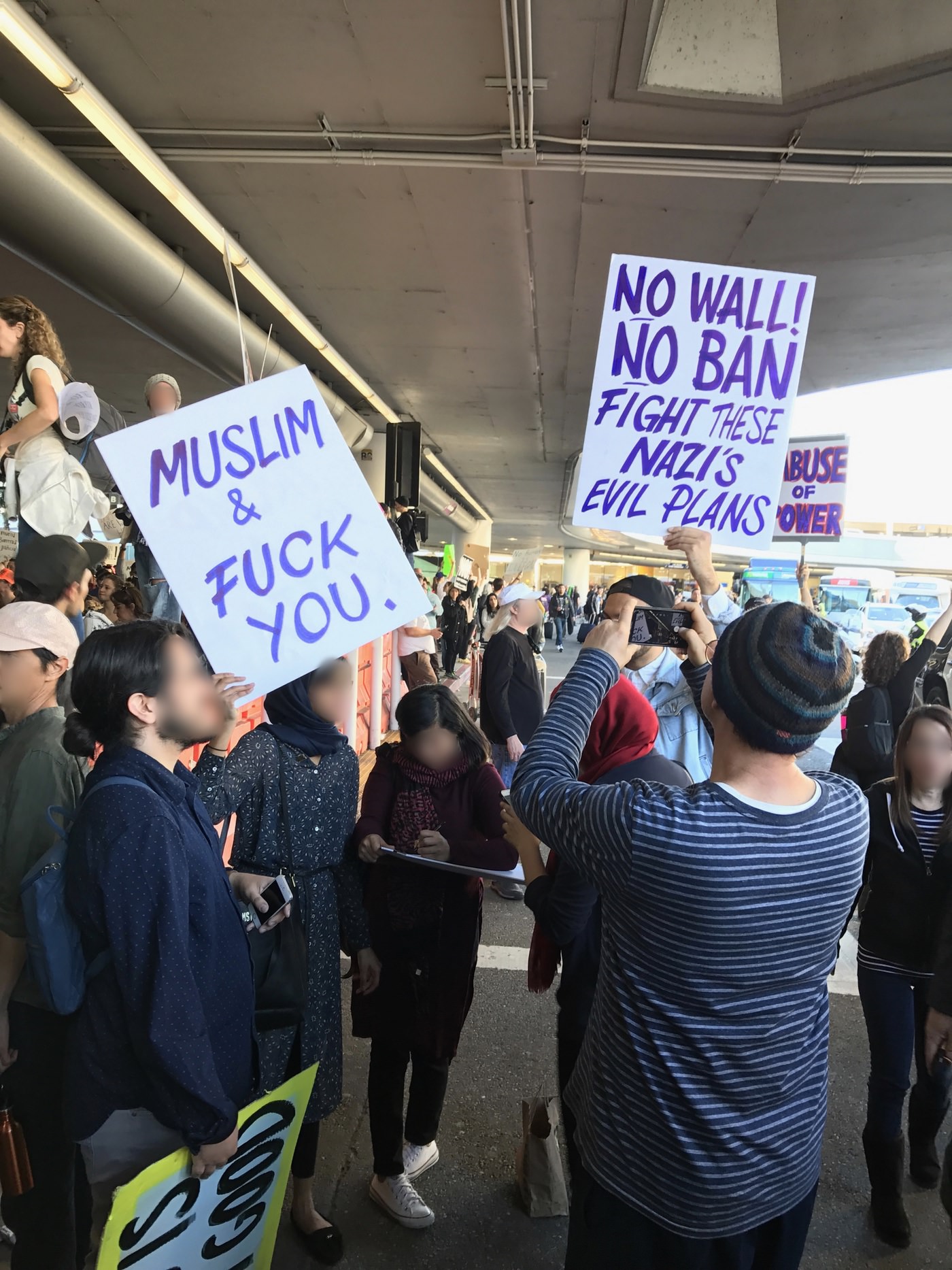
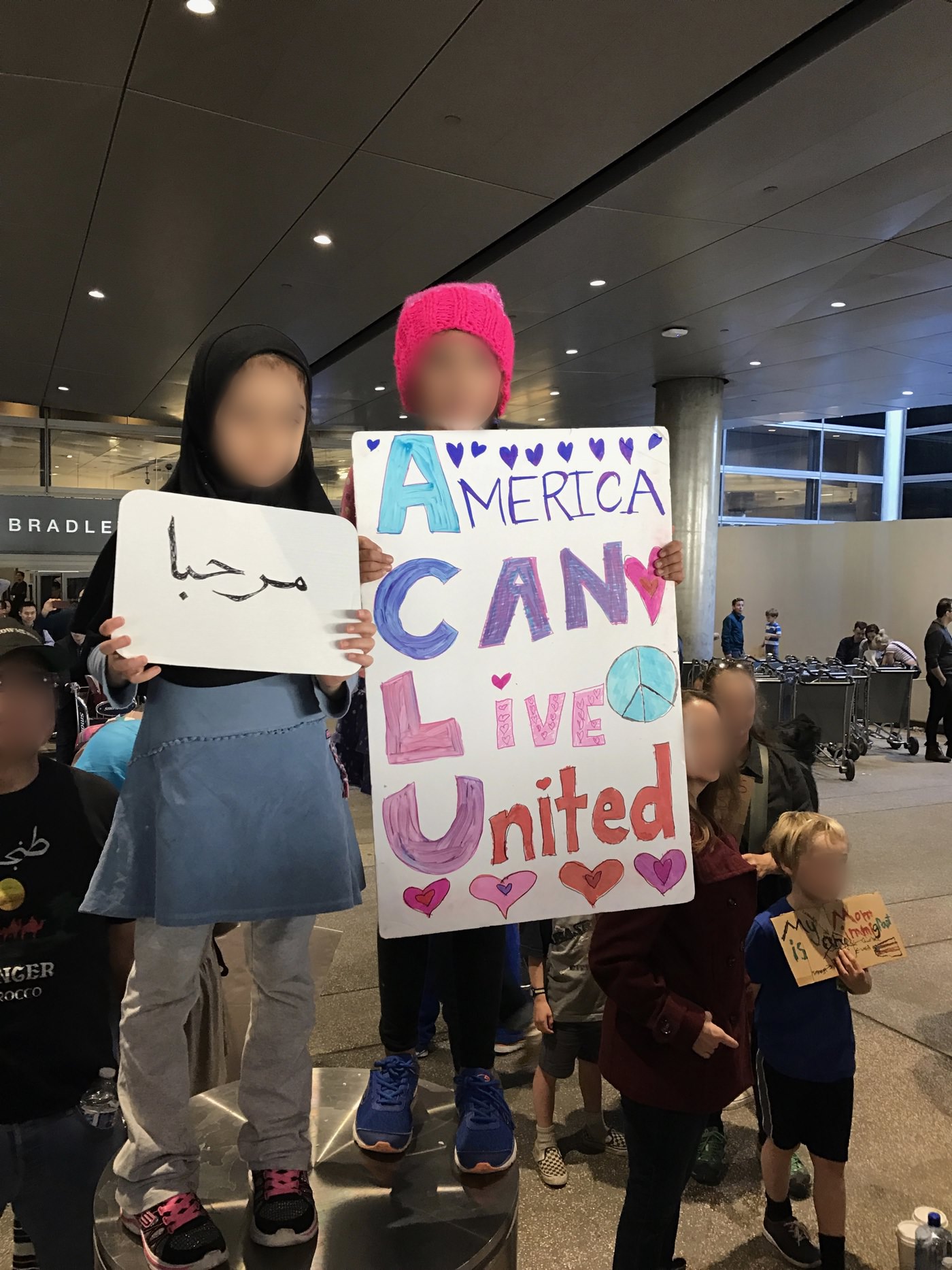

Thousands of people gathered at Los Angeles International Airport demanding the release of everyone detained under Trump’s Muslim ban—a demand which reportedly was won late in the day. The demonstrators hailed from all kinds of backgrounds—Muslims, Jews, Christians, and even a guy with an “Atheists for Muslims” sign. I also saw a lot of animal rights activists.
The crowds circulated inside and outside the terminals. Protesters blocked the inside lanes for hours, then blocked the outside lanes, effectively shutting down one entire level of LAX.
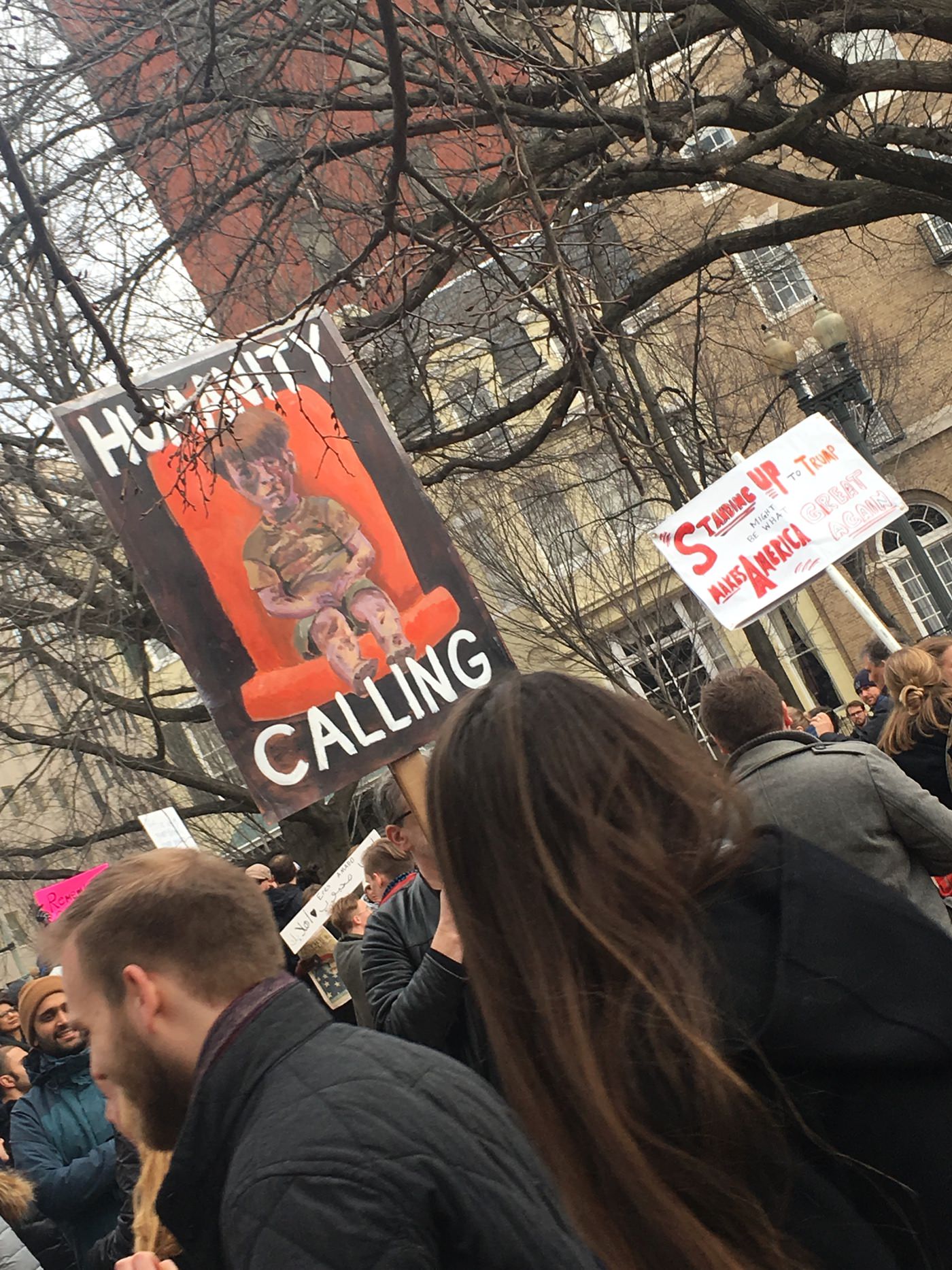
Multiple protests took place in DC today in response to Trump’s ban on Muslims entering the United States.
First, a crowd of hundreds gathered near the Capitol to oppose the nomination of Betsy DeVos for Education Secretary. Thousands more streamed to the White House over the course of a couple hours to oppose and stand in solidarity against the #MuslimBan. Called for the night before on social media, the demonstration initially numbered in the low thousands and grew to as many as 10,000 in the late afternoon, when participants decided to march from the White House to the Trump hotel.
At the hotel, the crowd immediately removed the metal barricades blocking access to the front steps and entrance, then swarmed the hotel. About 1000 people sat down in front of the entrance while thousands more stood watch and chanted in support. Before sunset, crowds of hundreds more continued to make their way from the White House to the hotel, with distinct protests happening in each location, as a third crowd also totaling in the thousands streamed consistently down Pennsylvania Avenue toward the Capitol. Traffic was at a standstill at many major intersections downtown and Pennsylvania Avenue was closed for hours between the White House and the Capitol. The most spirited and lively chant was “No Trump, No KKK, No Fascist USA!”
Protests also took place at Dulles Airport, National Airport and BWI Saturday and today—all in the DC metro region. Each of these demonstrations attracted thousands.
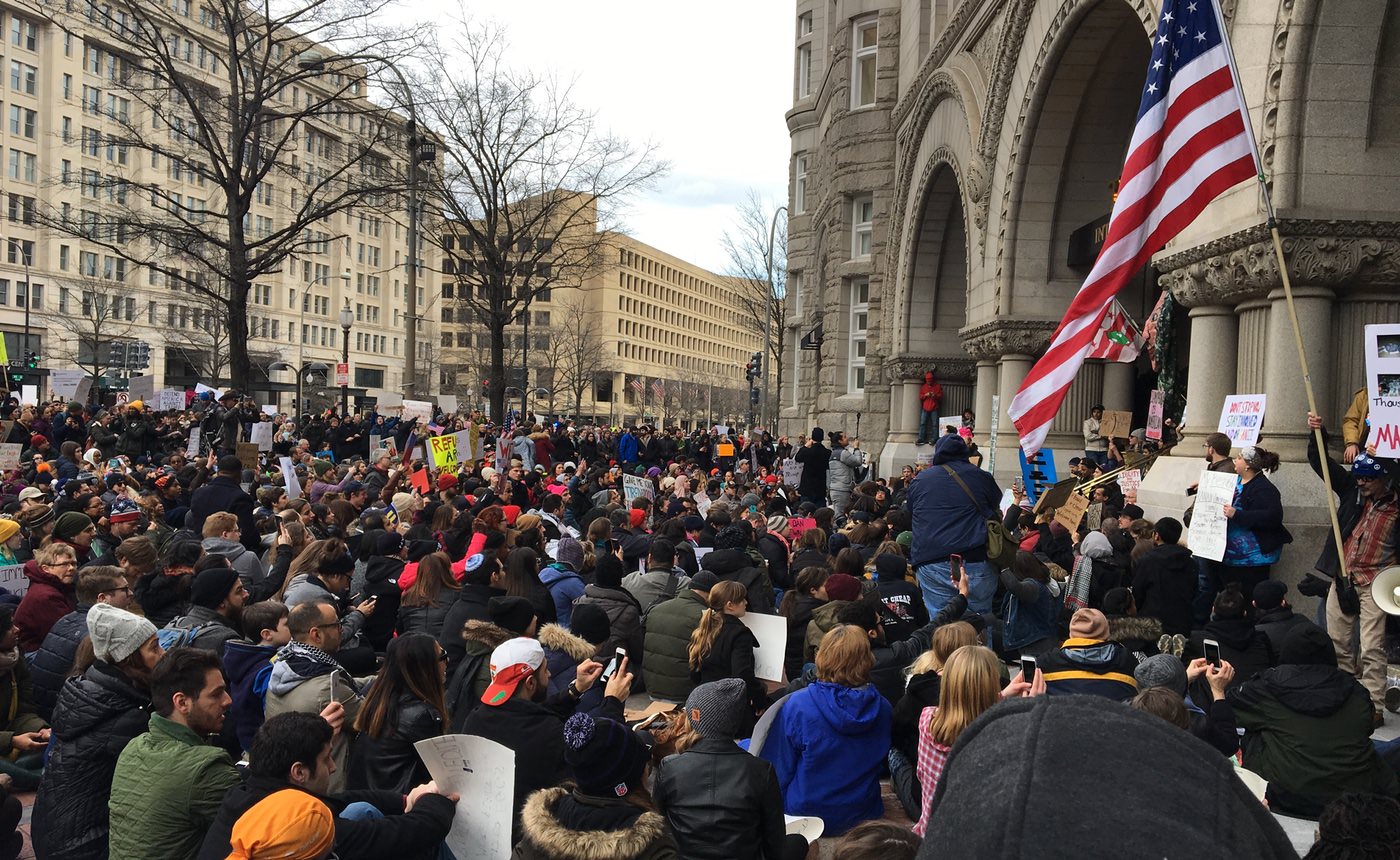
Sunday afternoon sit-in and shut down of entrance to Trump hotel.
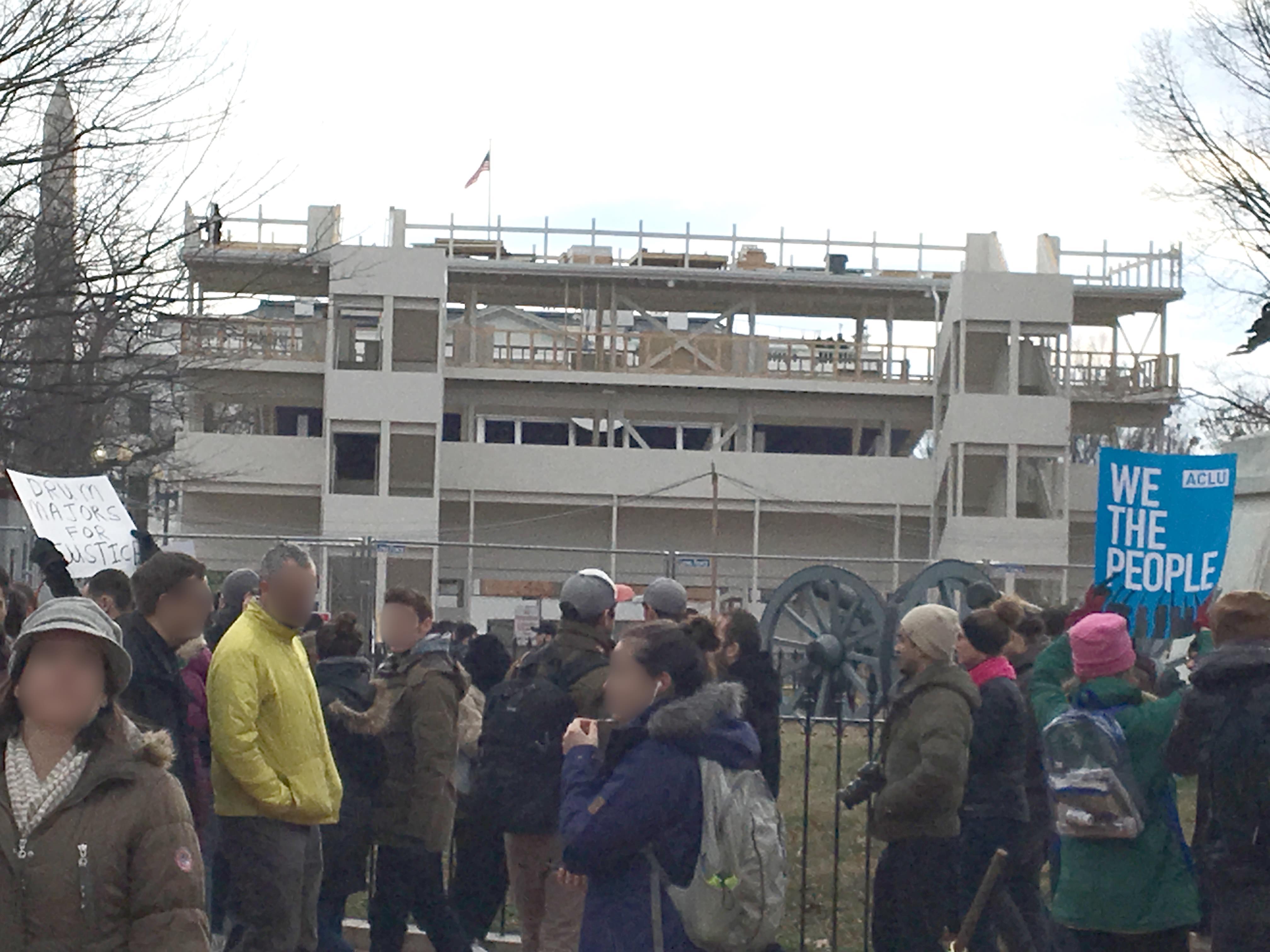
Inauguration stands remain in place in front of the White House, obstructing access by pedestrians and protests. This is why the crowd left to go to the Trump hotel once it reached a certain size. One has to assume the stands were left here on purpose.
Tense moment after barricades are removed at Trump Hotel. Note that there are no police in sight. This is the area that the government of DC, in agreement with the Trump hotel, has declared a “no protest zone.”
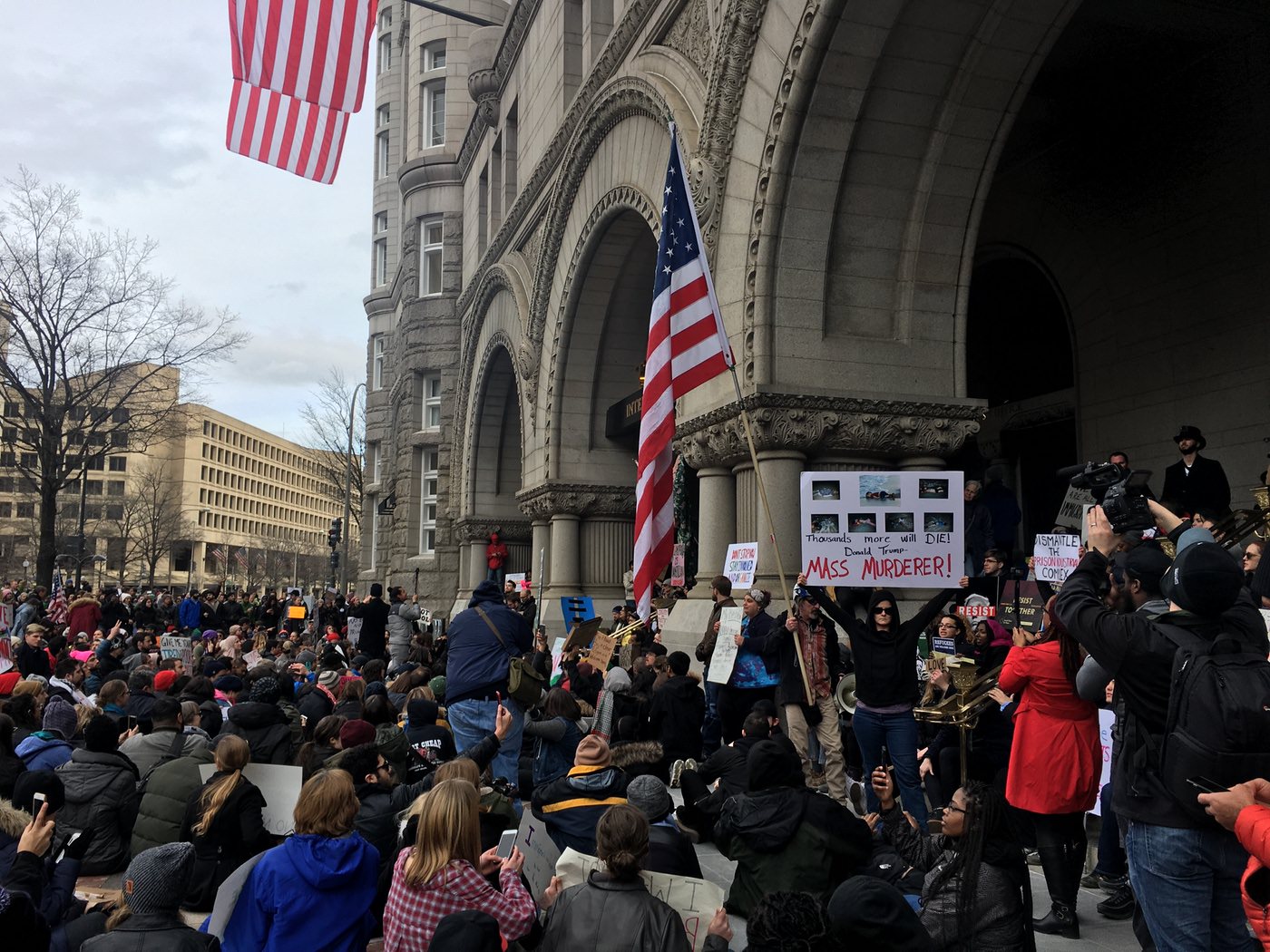
Trump Hotel sit-in.
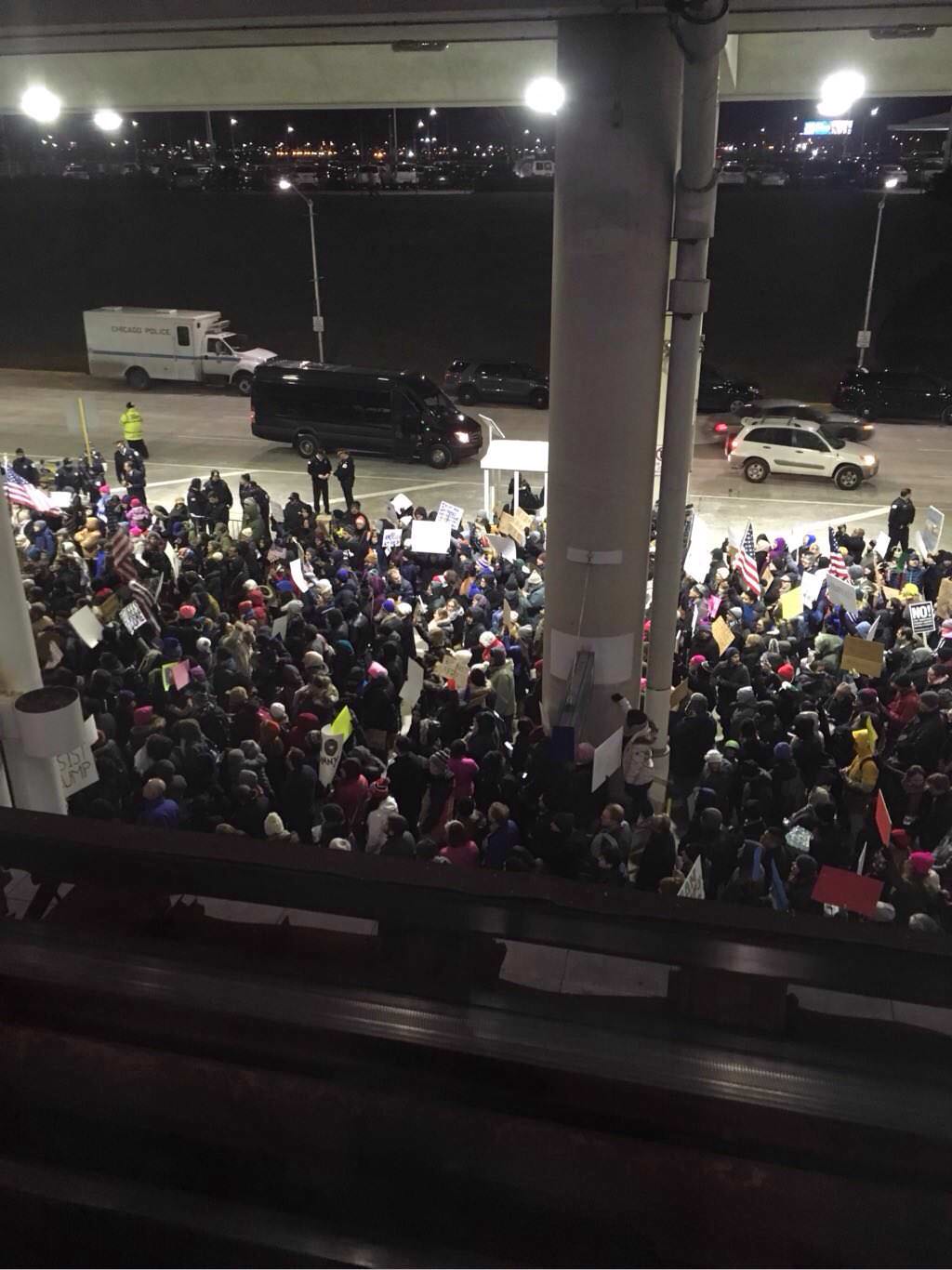
Standing outside in the freezing cold at Chicago O’Hare Airport, the crowds keep growing, and the anger keeps building, as people gather in solidarity with Muslims and refugees. Many of the participants are protesting for the first time; many children are present. The chanting is fierce, but no one has moved to take the traffic lanes yet.
Trams and trains full of protesters are arriving steadily—about fifty people every twenty minutes. Several hundred are gathered outside, with close to that number inside as well. The police have confiscated a sound system. As we receive this update, the crowd is up against a gate, ready to push.
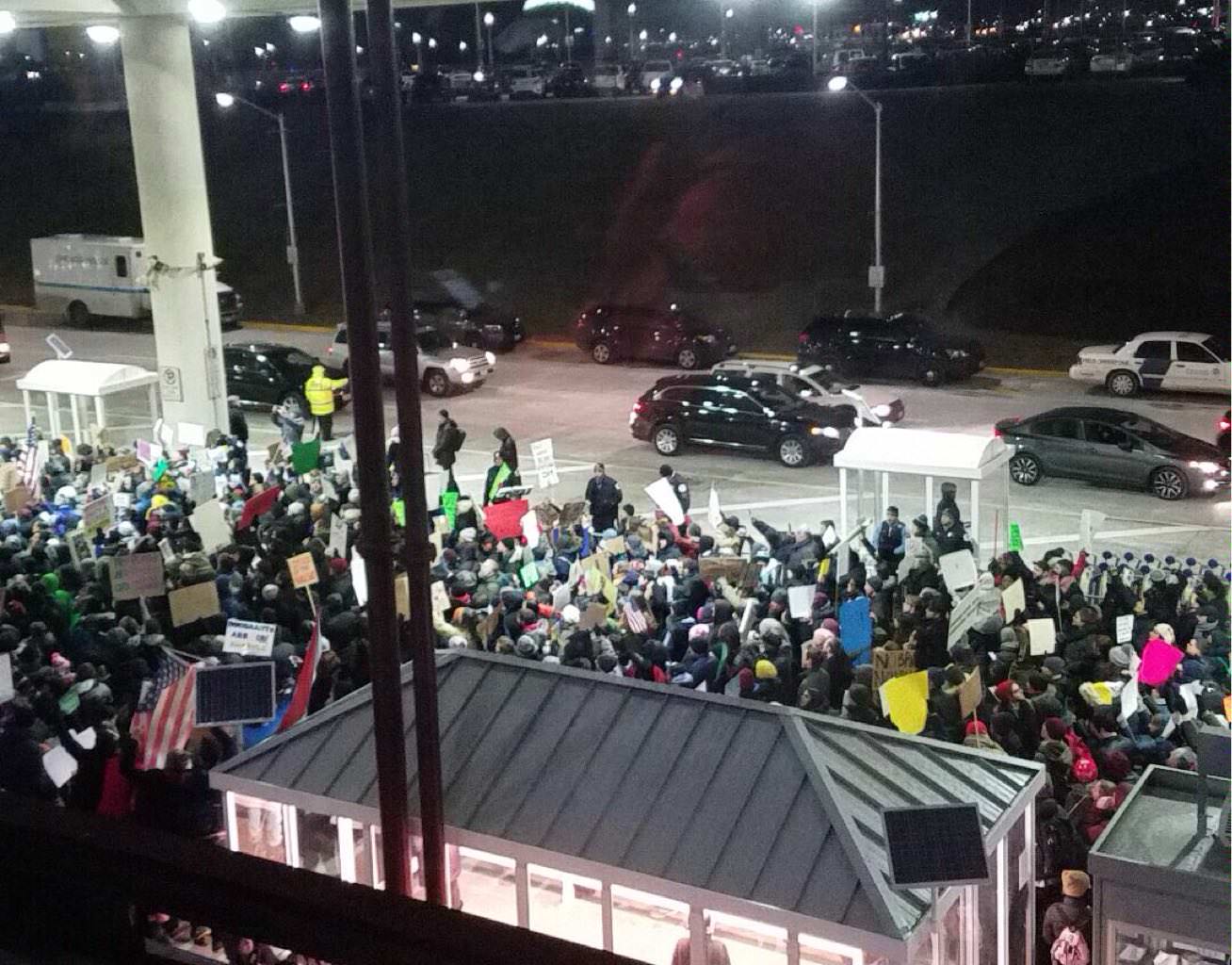
Update
The spirit was high at Chicago O’Hare Airport as people jumped and chanted “Build the wall—we’ll tear it down.” A crowd comprised of youth and elders alike marched back and forth. We were penned in on all sides and there were large number of undocumented people, so we couldn’t push the line. A small group congregated to figure out how to storm the airport or push the line; we were reminded of the importance of bringing your own megaphone to these protests in order to properly intervene. Despite all this, it really does feel like more and more regular people are developing an opposition towards government itself. Let’s become ungovernable!
Massive protests occupying and in some cases shutting down airports all around America, demanding freedom of movement and the end of border controls—this seemed impossible when we used to dream about it a decade ago. Today, being ungovernable is becoming contagious, and it’s time to dream bigger. The streets are already alive. We need more of this, more of what’s happening now. Making it last, helping it expand, these are the preconditions for something even more disruptive and more powerful to emerge: shutting down the airports, blocking the ports, occupying the warehouses, and creating something beyond the economy and the state!


Last night about 40 people out of the thousands who were here protesting at midnight spent the night in SFO airport. Today, all international departures gates have been blocked here, with many human barricades actively blocking big guys trying to push through to their flights. There have been reports that the families detained here were released, but demonstrators are determined to stay “until the detainees are released everywhere.”
Here are two accounts from Saturday’s protests at SFO.
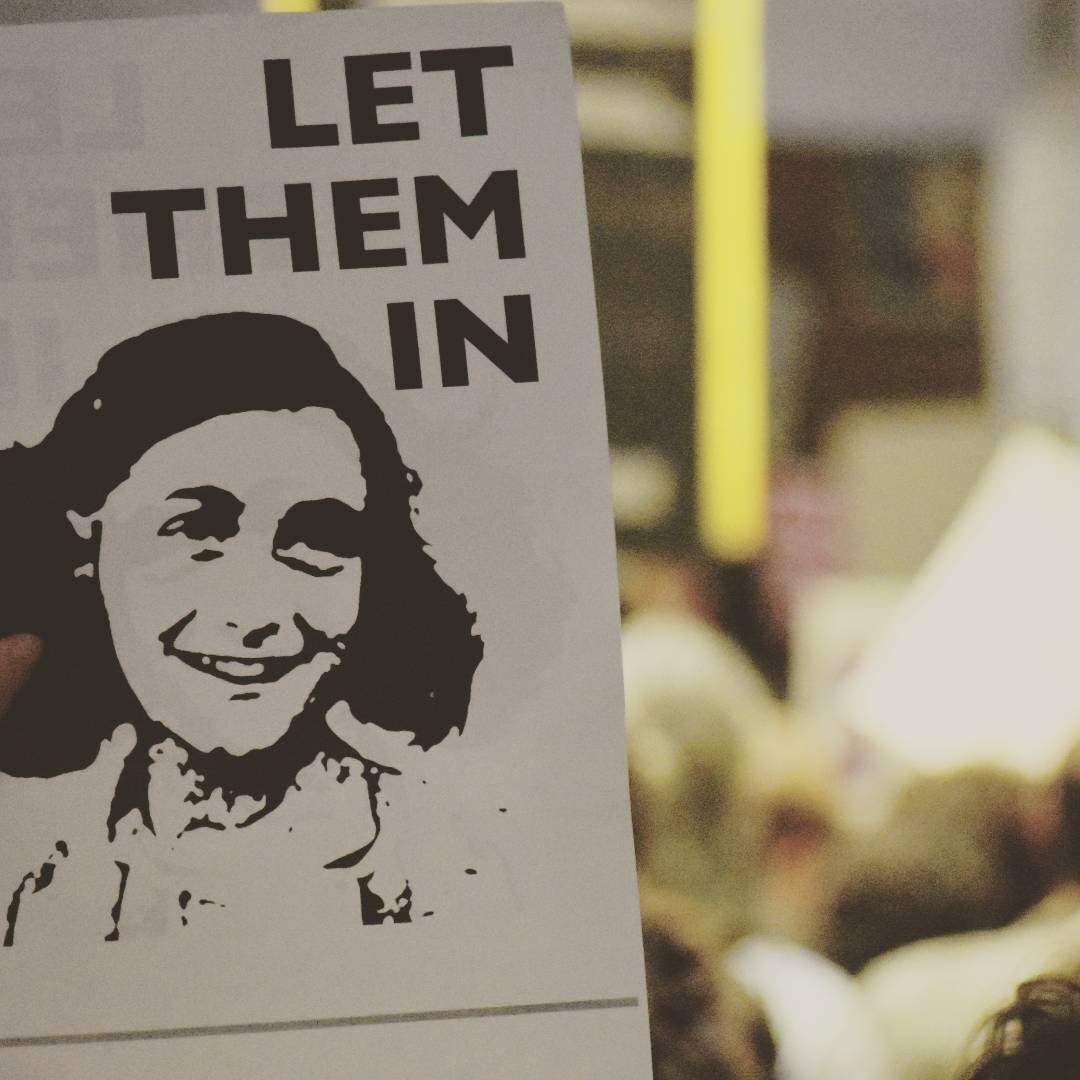
If — last year — you had told me that open fascism would take root in the US within a year I probably would have believed you. But, if you had told me two months ago that the SF International Airport, and airports around the country, would be shut down by hundreds of liberals chanting “no borders, no nations,” ready to free detained immigrants by any means necessary — I would have thought you had completely lost your grip on reality. But that’s exactly what happened at SFO last night.
When my friends and I arrived there were already hundreds of people there, completely shutting down the street in front of the international terminal. The air was thick with possibility — children and elders chanting, cheering, ready to make a stand. The crowd moved inside, eventually taking over the entire international terminal, shutting down traffic and the security checkpoints. As more people arrived throughout the evening so did a grand feast. Pizzas by the dozens, sandwiches, fruit, granola bars, chocolate, water. There were full pizza boxes stacked 4 feet high in multiple places. I have never seen so much food at a protest. Apparently when the middle class gets pissed, the revolution will be well fed.
Later in the evening as the crowd was starting to tire, the revolutionary marching band, Brass Liberation Orchestra, arrived on queue and started playing in the middle of the international terminal. A cheer rose up from the crowd and everyone started dancing. By midnight my crew was tired and ready to leave, but the action was still going strong, with more folks arriving by the minute. I’m told that many stayed in the airport all night, and today the crowds are even bigger than they were yesterday, with no signs of stopping.
This is one of the most singularly amazing actions that I have seen in 15 years as an activist in The Bay. I haven’t seen crowds this big at a direct action since Occupy Oakland, and the crowds are far more diverse in terms of class, race, and political spectrum. The US middle class is pissed, they are ready to fight, they are beginning to question their belief in the validity of the state. Anarchists and freedom fighters must seize this moment. We have been fighting the state for years, and now we have the opportunity to shape this nascent movement into a radical one.
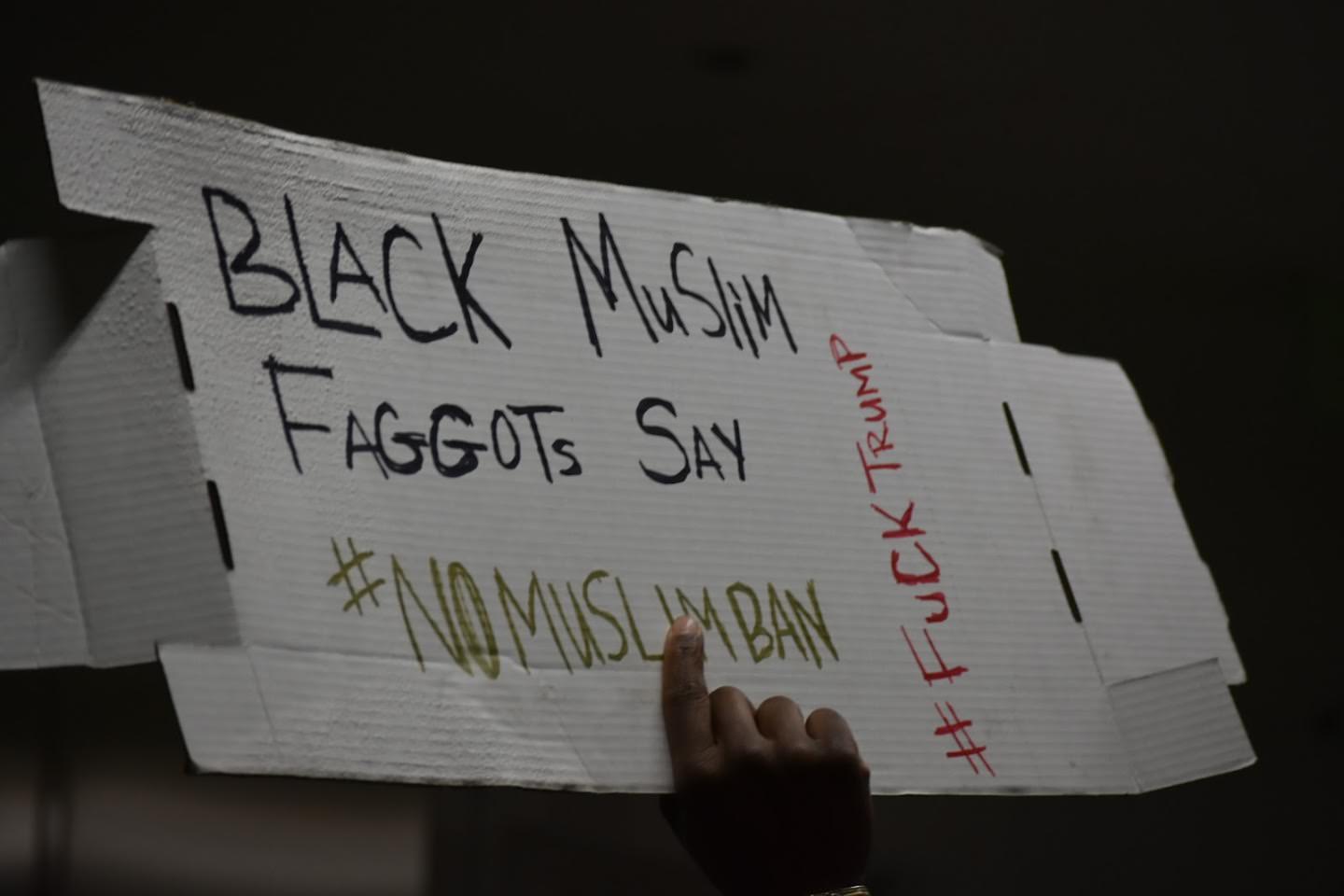
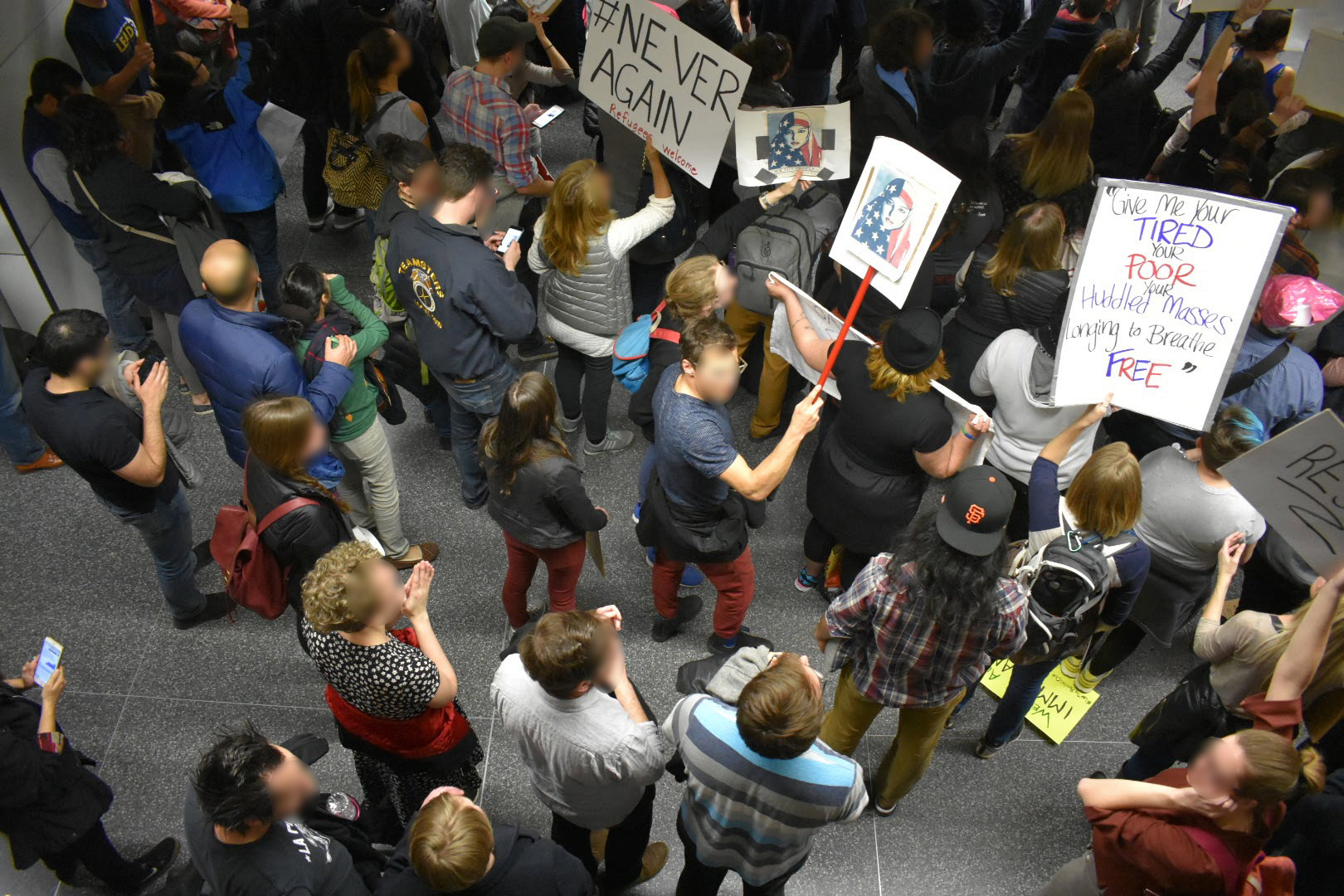
Early Days and Innocence at SFO
At San Francisco airport on Saturday afternoon the #MuslimBan protest developed very quickly. At first it was a circle of a few dozen, then a couple of hundred Quaker-ish looking folks with homemade signs, chanting. A few cops buzzed around us on Segways. A little before 3pm, the protest start time, they asked us to go outside. A surge of people arrived from public transit, some as individuals and families and some as loosely organized groups. The crowd grew to over 1000 very quickly. California Highway Patrol, SF Police, and airport security hung back around the edges. Once we spilled out into the street, police more obviously started taking photos of the protesters. Many people were in the street holding their small children. It struck me that disabled people and those with small children were usually on the edges of the crowd being heavily photographed by the cops. It really made my back itch!
I jumped the curb in my wheelchair to get into the street and zoomed around the perimeters of the main protest, reporting the crowd’s mood on Twitter. Phone and wifi coverage was spotty; lots of people were livestreaming snippets or uploading photos. During protests and marches I like to report on the event as steadily as possible, while also keeping an eye on other reports and news coverage, to calibrate my own ability to judge what’s happening and how it gets reported later. Reporting consistently means that people end up asking me questions — simply how to get there, or if it feels “safe” for disabled people or parents with small children, or for me to ask around to see if people need particular supplies. If you aren’t super into chanting Hey Hey Ho Ho for the 50 millionth time in your life, as I am not, then being a reporter and information node — or a dispatcher and quartermaster — is a very useful role to take on!
“Move, Trump, get out the way, get out the way Trump get out the way” was a popular chant. But the one that inspired protesters the most was simply “LET THEM GO! LET THEM GO!” People were cheerful, sharing information, asking for help, making way for others; lots of easy camaraderie. It feels like early days, a feeling of civic duty and starry-eyed trust, innocence.
Families of people being detained were in the airport. There was a group of immigration (and other) lawyers there to help. Many people declared that they weren’t going to leave until all the travelers detained were released. Since planes will keep arriving over the next week, the protest will likely continue.
As the crowd grew, more structure started to develop, with people using tactics fairly well known from Occupy, like the human microphone. A bit later, people took over the (empty) information kiosk for distributing information, water, food, and battery charging. People showed up with huge amounts of pizza.
In the evening the police put on helmets with face shields but otherwise didn’t heavily riot gear up. One friend of mine went around offering them pizza. “Take off your helmet and have some free pizza!” Police and security refused, but the airport maintenance workers happily shared pizza and talked about their own and relatives’ immigration stories. The most tense moments from SFO seem to happen around the security checkpoint areas, where cops put on their face shields and line up in a militant way.
By that point I had left. I continued following the livestreams from SFO until midnight. A jazz band (including someone playing the tuba) showed up to entertain the crowd. A few hundred people stayed overnight. The word was out that a new shift would show up at 6am, but the main invitation for people to come back was aimed at noon on Sunday. It was beautiful to know that people were determined not to leave, not to let the protest fizzle out. It was heartening to see so many people come to SFO on Sunday to keep the energy going!
The last thing I’d like to mention is that, no matter what happens in the current situation, we should support the struggle to free people already being detained through organizations like Detention Watch Network. People talk about being afraid of “camps”… Well, the “camps” are already here.
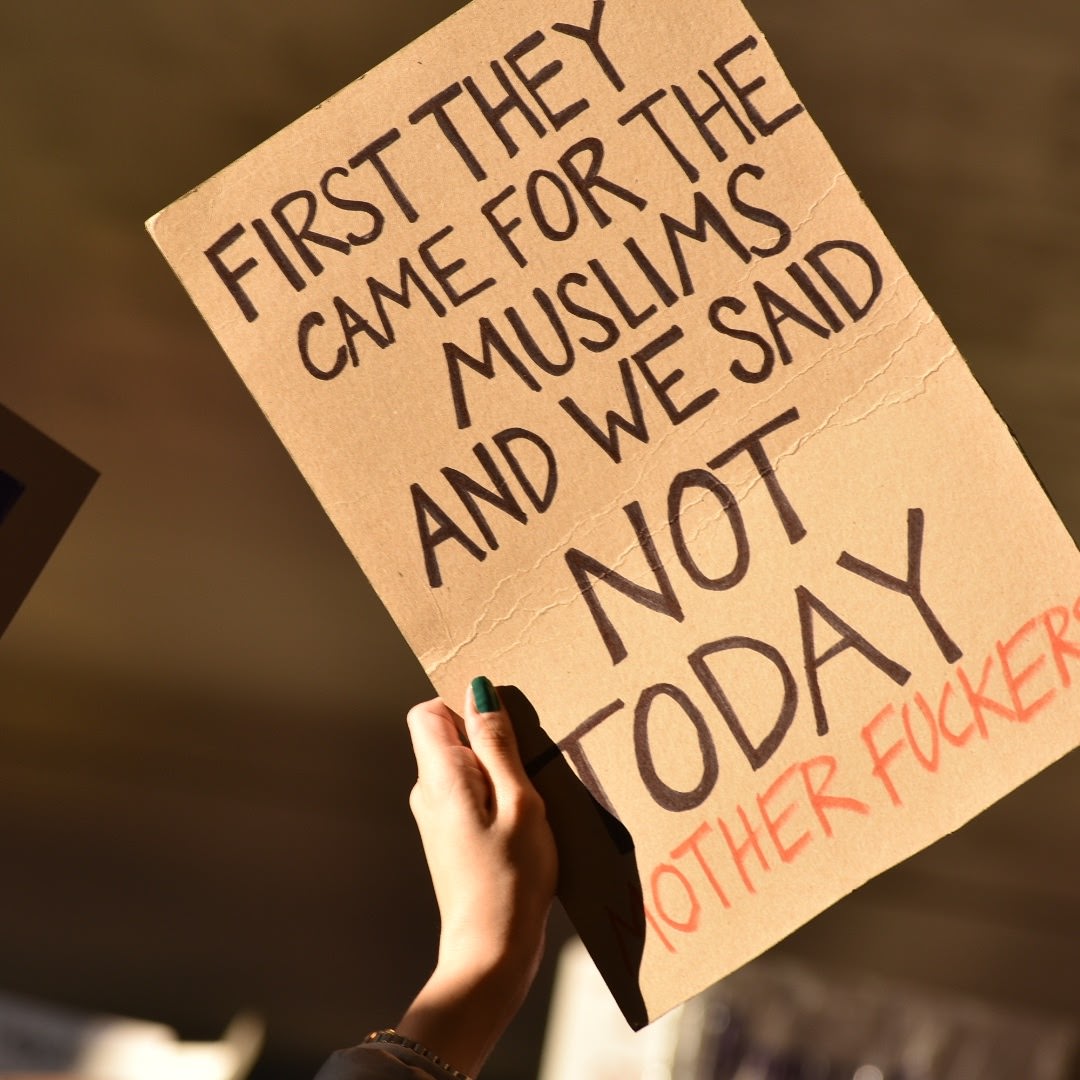


Two or three thousand people gathered outside of the drop off area and baggage claim at the Hartsfield-Jackson International Airport and slowly began blocking traffic. A smaller group of a few hundred marched around the southern domestic terminal. Eventually, roughly 500 broke away from the march outside and entered the airport chanting, “No borders, no nations—no more deportations” and, later, “Fuck 12” and “Who do you protect, who do you serve?” as police began shoving and striking demonstrators of many ethnicities, ages, and races, many in masks.
While they were inside, about forty people chased around the mayor of Atlanta, chanting “Sanctuary city!” aggressively at him. During clashes with the police, they managed to surround the group of officers. Participants linked arms and protected each other in the face of police violence.
Pushing and shoving with police lasted for about 30 minutes. Eventually, the crowd ran back outside, chanting “Alerta! Alerta! Antifascista!” with hundreds still participating. This crowd danced outside for another hour, recited “Assata’s Prayer,” and attempted to force their way into the airport again. Police shoved protesters who identified an undercover officer, pictured below.
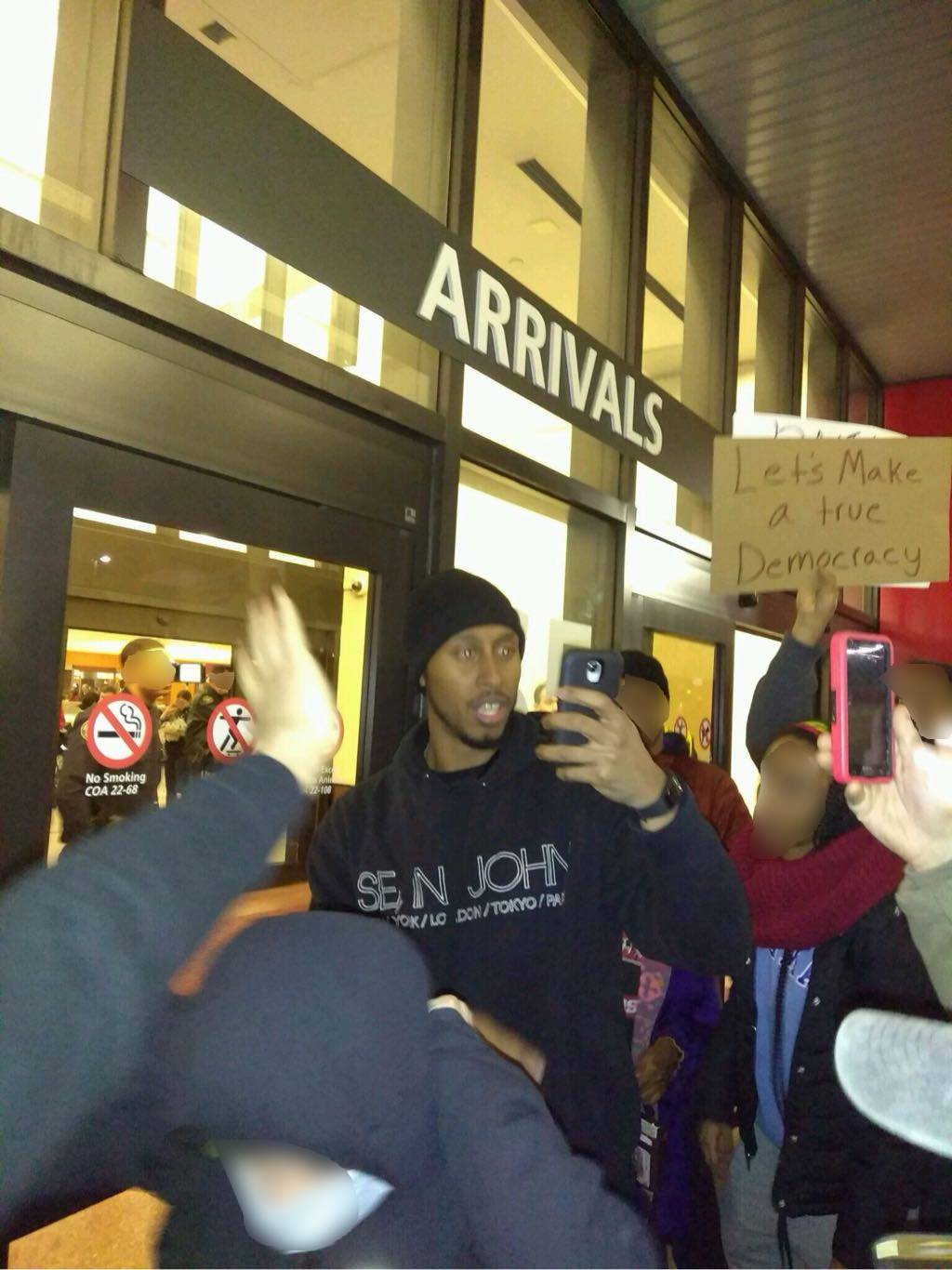
Delta Airlines also reportedly experienced an unexpected computer outage.

Today an estimated 30,000 people marched and effectively shut down a large section of the financial district of downtown Manhattan in an unpermitted demonstration. Simultaneously thousands protested outside JFK airport in an immediate response to the latest manifestation of Trump’s burgeoning fascism.
These protests began with an unplanned gathering of people outside of terminal 4 of JFK airport yesterday morning in response to visa holders being detained pending forced return to their countries of origin. Some detainees were released, and a federal judge for the Eastern District of New York ordered an immediate stay on Trump’s Muslim Ban subsequent to these massive outpourings of anger, but others continue to be held and deported, even after the ruling.
Anarchists and other radicals participated in the actions outside of JFK, federal court, and in downtown Manhattan both yesterday and today. While all events remained peaceful and relatively controlled by NYPD, people who had never been in the streets before visibly found their power in a conflictual relationship with the police and other functionaries of the new regime.
Unpermitted demonstrations of this scale have not taken place in New York since the height of the Black Lives Matter movement, and look set to only grow in both size and fury. Elected officials are clearly seeking to benefit from these events in every way they can, but their cooptation will only take them so far as more and more New Yorkers realize that Trump is a symptom of a larger disease.
We gathered at Battery Park, in lower Manhattan, with what seemed like ten thousand New Yorkers in the mid afternoon. Mayor Bill DeBlasio spouted statistics regarding the number of immigrants that make up New York’s diverse work force and how our city’s economy is a direct result of our nation’s visitors.
The crowd cheered at each pause, chanting to the beat of the resistance. As far as the eye could see, every race, color nationality and age imaginable. I was standing near a father and his two young kids. The one on his shoulders proudly held a sign that said, “Our grandfather was an immigrant.”
As the sun set, over the Hudson River, the cold winds swept across the energized masses huddle and reciting their mutual mantra of the movement. Together, we marched up Greenwich street with a mellow drum beat in the distance yelling with the devilry of an impassioned movement “Say it loud, Say it clear… Refugees are welcome here!” We witnessed hundreds of folks live-steaming, chanting, photographing and documenting along the route. #NoBanNoWall
As we passed towering government facilities, like the Port Authority and City Hall, the police presence was amplified. The energized crowd emphatically chanted “Fuck the wall! We’ll tear it down!” while moving along without altercation.
It was cathartic to be around so many incredible Americans standing up for a belief that we hold to be self evident. It feels like this is only the beginning of a much larger resistance.
— Amy, Andrea, Dru

5000 protesters at SFO. Security checkpoints at both International terminals are blockaded, along with most entranceways and escalators.
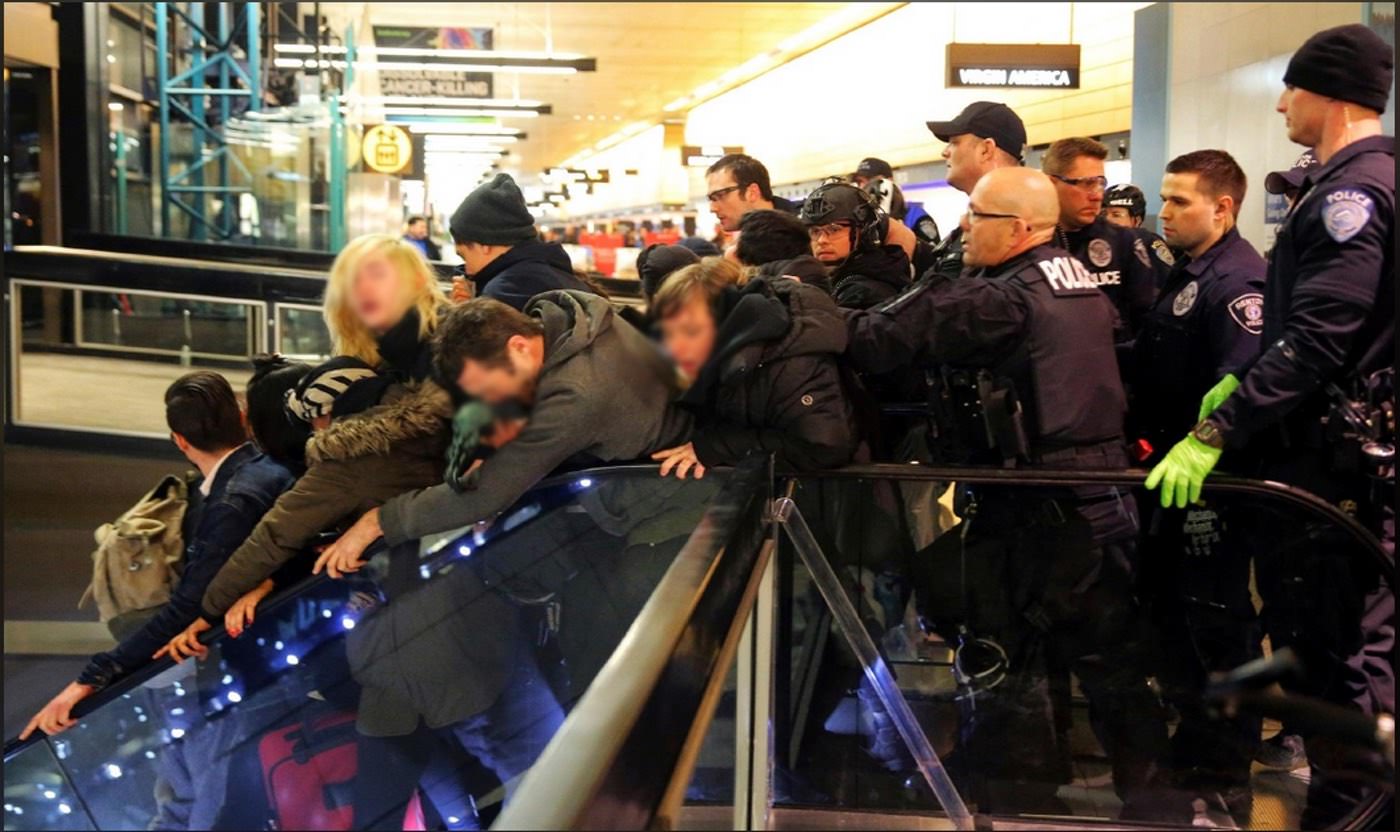
Reports said that thirteen people from various countries were detained as they exited planes at Sea-Tac Airport outside of Seattle. Area folks quickly mobilized to occupy the airport. Within hours, local media was estimating the crowd to be around 10,000 people, numbers that had brought operations at the airport to a standstill. A handful of arrests took place in the early hours, and police pepper-sprayed people repeatedly.
Around 9 pm, the Socialist Seattle City Council member Kshama Sawant, no stranger to co-opting grassroots movements, called to the crowd of thousands to leave the airport in favor of a rally in downtown Seattle the following day. Unfortunately for the folks who believed that the site of detention was the appropriate front to fight on, many people heeded this call, undermining the protest and leaving the rest of us vulnerable to the cops who now outnumbered us.
In the hour leading up to midnight, the cops were fairly passive, mostly just staring at the two groups of people that had earlier been separated from each other. But around 12:30 am, they announced that they would be moving on us. We were quickly kettled, with our backs to a balcony and one escalator as the only means of escape. The crowd of around 100 held the line for several minutes until the cops began indiscriminately pepper-spraying people directly in the face, leaving them to blindly stumble down a stopped escalator.
While we heard that several of the detainees had been released from Federal custody, around two dozen protesters were arrested. The arrestees were immediately transported to the light rail station and released—though the light rail was done running for the night.
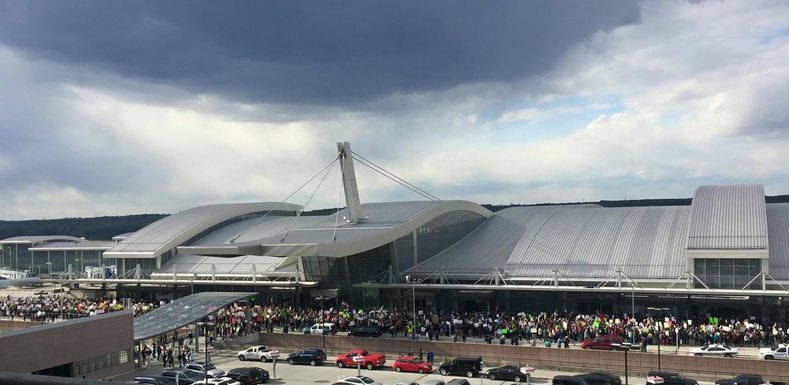
When we arrive at the airport, the police have designated a protest area. It’s outdoors, past all the departures entrances, along the side of the access road. They are herding people along the sidewalk, around the protest area, and behind a line of yellow tape.
Lots of people keep arriving, and the protest area is already close to full. A group of women in hijab are chanting boisterously in the front, behind a police car parked sideways to block off the crowd. We walk all the way down the line of tape to the end of the area, the furthest point from the terminal. Police are holding a perimeter on the other side of us so vehicles can pass. Here, at the very back of the crowd, we find some people in darker clothing with anarchist banners.
This is no place to be. We’re not mobile, we can’t keep up with what’s going on elsewhere, and there’s no room to expand. As more people arrive, we’ll just be sandwiched in here, part of an immobilized mass. I’m not interested in being isolated with people who share my opinions—I want to open space in which people can take action to interrupt Trump’s fascistic program. We didn’t come here to see what will happen, but to make things happen.
The main challenge we face here is how to avoid containment so our actions can spread into the rest of society and we can continue connecting with more people and rendering more spaces ungovernable. If we just express disapproval, Trump will win: we have to take effective action to make it impossible for him to implement his agenda.
We leave the protest area, walking all the way back around the yellow tape, inside the perimeter of police securing a lane for vehicles to pass. We go back to the front of the terminal, where people are passing on their way to the protest area or their flights. We stop there, loitering for a moment. A police officer comes and tells us we have to keep moving. We move back about ten feet, and his attention is distracted by other responsibilities.
Others on the way to the protest area are lingering with us; we’re starting to form a knot of people outside the zone of control, but we aren’t identifiable as a cohesive group yet. We begin chanting back and forth with the boisterous women at the front of the protest area. The crowd is swelling to such an extent that they are being pushed forward around the police car. As the police are trying to maintain order around the protest zone, we unfurl two big anarchist banners on the other side of their line. The boisterous women at the front peer over at our banners, and then begin a chant based on one of the inscriptions.
The crowd swells forward again, moving around the police car—and we step into the street, stretching our banners across it, and march forward. Over a thousand people flow in behind us, out of the containment zone. We have the combination of assertiveness, numbers, and surprise that makes any group unstoppable.
We march past all of the entrances to airport departures, stretching the crowd across the entire front of the terminal. The police scramble to block the doorways and the road, but we have accomplished our task: for three hours, the airport is shut down and flights are pushed back. Police officers are harassing the crowd, saying the protest has been canceled and the permit revoked, but there is nothing they can do to stop us. Our courage and assertiveness is our permit. When the police try to push forward, the crowd chants back: “Who keeps us safe? We keep us safe!”
At first, one of the organizers is dismayed; it’s always scary to go beyond what you planned for. The protest he had envisioned was to involve 150 people kettled in a free speech zone. But this is 2017 and the US is escalating into fascism on one side and resistance on the other. You can’t trap 1000 of us in a little protest area obeying the law while families are being ripped apart and people are being deported. We will not permit this to happen—we the targeted, we the anarchists, we the people of good conscience.
Wherever you are, you can do what we are doing. Go to the place where people are being detained or deported or repressed. Find other people who are angry. Figure out what factors are containing you and where the loose edges are. Get on the other side of the limits and take decisive action to expand the space in which people can act.
What did you shut down today?





